#ALSO ALSO ALSO something i didn't explore as it wasn't quite as relevant BUT the book mentioned in daniel 12:1
Explore tagged Tumblr posts
Text
AND THEN
#OF COURSE AS IF I COULD FORGET. the different translations and the times of trouble. of course#and esv saying there shall be a time of trouble and nasb saying there will be a time of distress#BUT THEN. ceb saying it will be a time of distress#and this is where i become paranoid about my professor being on destiel gay sex tumblr and seeing this BUT WHO CARE !!#anyways the interesting difference in presentation in terms of establishing the times as difficult#like esv and nasb make it seem like it will come about but ceb makes it sound already established in a sense#ALSO ALSO ALSO something i didn't explore as it wasn't quite as relevant BUT the book mentioned in daniel 12:1#and how i KNOW it's referencing a specific book (the book of life i think) but how it says everyone who is Found written in the book#(or scroll depending on translation)#and to ME the ''found'' is so so interesting#like. everyone who is found written in the book#where else is this book mentioned!!! i don't care about the desolation of the abomination anymore i want to study the various biblical#passages that mention and explore this book#and NO it's tooootally not because i love the paradox of choice versus the omniscience and omnipotence of God ...... totally....#if he already knows who will be saved and shit and set everything into motion then HOW can it be a choice???#and of course the difference of size in infinities#if there is the perfect amount of space for the people who choose to believe then if one more person believed there wouldn't be enough#space except for of course the fact that god would know and there would be space#if you have a motel with infinite rooms but you also have infinite peoplethen all the rooms will be full EXCEPT#they can't all be full because they're infinite except of course you have infinite people so they are all full#but that doesn't matter anyway because the motel doesn't have a pool so we weren't going to stay there anyways#we'll go to the inn and suites across the road#timothy's txts.#WHO KNOWS WHAT I'M SAYING. NOT ME. i just say shit for funsies#tw caps#tw swearing
4 notes
·
View notes
Text
The Crow Road by Iain Banks
I finished The Crow Road and had a little time to think about it. I'll put my thoughts under a Keep Reading in case anyone is trying to avoid spoilers.
As I speculated before, I think it's likely that The Crow Road is more related to Good Omens in philosophy than in plot. I mean, it's not that the plots necessarily have nothing in common, and we could be very surprised in the end of course, but now that I've read the whole book, its philosophical commonalities with GO are both apparent and kind of inspiring. Also, if I were a writer, I'd be more interested in dropping hints about what themes are important than telegraphing my whole plot ahead of time.
So here, I will describe the book and point out themes that I believe may reappear in Good Omens 3.
This is a long post. If you read it, make a cup of [beverage of choice].
Update on 4/20/2024: I made a second post: The Crow Road and Good Omens: Further-Out Thoughts
Below are mentions of suicide, death/murder, and sexual acts.
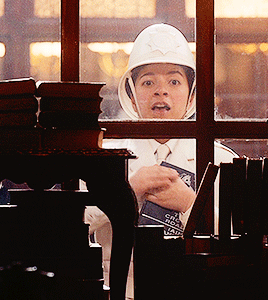
The Crow Road centers around a character named Prentice McHoan, a university student in Scotland who starts to sort out his complicated relationship with his complicated family as he explores the mystery of his uncle Rory's disappearance. Although the book is mostly from Prentice's perspective, the narration jumps around in time with the McHoan family. There are quite a lot of important characters to keep track of; the bare-bones summary I put below doesn't even include some of the important ones. I wanted to make the summary even shorter and simpler than this, but the truth is that this book is not short or simple, and if I made the summary any simpler, it might be downright misleading.
There are at least three major cultural aspects of The Crow Road that I am inexperienced with: the overall culture in the 1950s-1980s (I was born in 1988, so of course wasn't here for the relevant decades), the international experience of the Gulf War (again, born in 1988), and the history and culture of Scotland itself (I'm USAmerican with only reading as a source). As a result, I'm sure there are important dimensions to the book that I've missed. If someone has a different perspective taking some of these things into account, I'd love to know about it.
Also, keep in mind, there is a great deal of descriptive writing in this book. There are a lot of pages about the geography of Scotland, and about Prentice as a kid, and about Prentice's father and uncles hanging out together in their youth, and about various family incidents, and about Prentice spending time with his brothers and friends. At first, these passages seem to just make things more confusing, and in my head, I accused them of being "filler." But they definitely serve a purpose. They're a way of showing and not telling the characters' attitudes and relationships to each other. More importantly, because we get to actually live these experiences with the characters, they are what give all the plot points below their deeper emotional impacts. In other words, the everyday experiences give the plot its deeper meaning. They resonate with one of the core themes in the novel: that our experiences in life, rather than any supposed existence after death, are what matters.
The Crow Road's story is like this:
Prentice is rather directionless in life, and he seems to have trouble investing any energy in his own future as he moons over his unrequited feelings for an idealized young woman named Verity. Soon, Verity ends up in a romance with Prentice's brother, Lewis, and Prentice feels that Lewis "stole" her from him. Prentice has also become estranged from his father, Kenneth, over spirituality. Prentice believes there has to be something more after death because he feels it would be incredibly unfair if people didn't get anything other than this one life; Kenneth is not only a passionate atheist, but is offended by the notion of an afterlife.
Prentice's uncle Hamish, Kenneth's brother, has always been religious, although his religion involves a number of bizarre and offbeat ideas of his own, with inspiration from more traditional Christian notions. Prentice is not really sure about this ideology, but he's willing to talk to Hamish about it and even participates during Hamish's prayers, whereas Kenneth is openly scornful of Hamish's beliefs. Hamish interprets this as Prentice being on "his side."
Prentice has a few opportunities to go back and talk to his father, and is begged to do so by his mom, Mary, with whom his relationship is still good. Mary doesn't want either of the men to give up their inner ideas about the universe; she just wants them to agree to disagree and move on as a family. Prentice says he will visit, but he just keeps putting it off and off and off.
Prentice acquires a folder containing some of his missing uncle Rory's notes in the process of hooking up with Rory's former girlfriend, Janice Rae, who seems to have taken a shine to Prentice because he reminds her of Rory. Using the contents of the folder, Prentice wants to piece together the great literary work that Rory left unfinished, which Rory titled Crow Road; however, it becomes apparent that Rory didn't turn his concepts into anything substantial and only had a bunch of disconnected notes and ideas. He hadn't even decided whether Crow Road would be a novel, a play, or something else. The few bits of Rory's poetry for Crow Road read are bleak and depressing.
Prentice also spends a lot of time with a young woman named Ash. They've been good friends since childhood and seem to have a somewhat flirtatious dynamic now, but they aren't in a romantic relationship; mostly, they drink and hang out together. Ash tells Prentice bluntly to get his life back on track when she finds out he's failing at school, avoiding his family, and engaging in shoplifting. She is a voice of reason, and when Prentice insists to her that he's just a failure, she reminds him that actually, he's just a kid.
Prentice's efforts to figure out Rory's story or location stagnate, and he continues to fail at school and avoid his father. He then receives word that Kenneth was killed while debating faith with Hamish. In fact, Kenneth dies after a fall from a church lightning rod, which he was climbing in an act of defiance against Hamish's philosophy when it was struck by lightning; Hamish is convinced that Kenneth had incurred God's wrath. Ash is there for support when Prentice finds out about the death.
With Ash's help, Prentice returns to his hometown again to help manage Kenneth's affairs. Prentice speaks with a very shaken Hamish, who is handling Kenneth's death with extreme drama and making it all about his own feelings. Hamish tells Prentice that Kenneth was jealous that Prentice shared more in common with Hamish's faith than with Kenneth's lack of faith. However, this isn't really true, and as he contemplates his father's death, Prentice begins to internalize one of the last things Hamish reported that Kenneth had argued: "All the gods are false. Faith itself is idolatry."
As the chapters go on, Prentice is compelled by some of the meaningful items related to Rory that he discovers in his father's belongings. He gains a renewed sense of purpose trying to solve the mystery of where Rory went and what happened to him. Among the interesting items are an ancient computer disk of Rory's that Prentice can't access with any equipment he can find; Ash uses her connections in the US and Canada to find a computer expert who can finally open the files on it. This takes quite a while, since the disk has to be mailed and Ash's connection is investigating the disk only in his free time.
Prentice also discovers that his feelings for Verity have changed. He no longer feels angry with Lewis for "stealing her." At first, Prentice's narration describes this as his feelings "cooling" as a result of the trauma of losing his father, but interestingly, this soon means Prentice gets to know Verity as a sister-in-law without getting caught up in jealous romantic feelings. Verity gets along well with the family, and Prentice is actually happy to discover that she and Lewis have a baby on the way. Prentice's relationship with Lewis improves greatly as well, partly because he is no longer jealous and partly because he realizes he does not want to lose Lewis, too.
Ash's connection who was looking at Rory's computer disk comes through and sends the printed contents of the files to Prentice. The files reveal to him that Rory likely knew Prentice's uncle, Fergus, murdered his wife by unbuckling her seat belt and crashing their car. Rory had written out a fictional version of events and considered using it in Crow Road. I'm not clear on exactly how certain Rory was about Fergus's crime, or whether Rory would have intentionally reported Ferg, or whether Rory even had enough proof to publicly accuse Ferg of murder, but people would likely have connected the dots in Rory's work and become suspicious of Ferg. For this reason, Prentice believes Ferg murdered Rory as well.
Prentice confronts Ferg. He doesn't get a confession and leaves Ferg's home with no concrete proof of anything; Ferg denies it all. But Prentice is soon physically assaulted in the night, and it seems Ferg was almost certainly the culprit, because he hadn't been home that same night, and he had injuries (probably from being fought off) the next day. A day or two later, Ferg's body is found unconscious in the cockpit of a plane, which crashes into the ocean. It's uncertain whether this was a suicide, but Prentice suspects it was. Rory's body is then soon recovered from the bottom of a waterway near Prentice's home, where Ferg had sunk it years ago.
As the mysteries are solved, Prentice realizes his feelings for Ash are romantic love. However, it's too late, he thinks, because Ash is about to take a job in Canada, where she may or may not stay. Prentice also hesitates to approach her because he's embarrassed about his previous behavior, venting all his angst about Verity and his father. He isn't sure she would even want to be in a relationship with him after that. But the very night before Ash leaves, she kisses Prentice on the cheek, which leads to a deeper kiss. They finally connect, have sex, and confess their mutual feelings. Ash still goes to her job in Canada, but says she'll come back when Prentice is done with his studies that summer.
The relationship's future is somewhat uncertain because something could come up while Ash is in Canada, but Prentice is hopeful. The book ends with Prentice getting ready to graduate with his grades on track as a history scholar, fully renouncing his belief in an afterlife while he acknowledges the inherent importance of our experiences in our lives now, and enjoying his time with Lewis and Verity and his other family members.
What's the point of all these hundreds of pages?
Well, look at all of the above; there's definitely more than one point. But the main point I took away is that we get this one life, with our loved ones in this world here and now, and this is where we make our meanings. There is no other meaning, but that doesn't mean there's no meaning at all. It means the meaning is here.
It's not death that gives life its meaning. It's the things we do while alive that give life its deeper meaning.
The Crow Road is described (on Wikipedia) as a Bildungsroman, a story focusing on the moral and philosophical growth and change of its main character as they transition from childhood to adulthood ("coming-of-age novel" is a similar term that is interchangeable, but more vague and not necessarily focused on morality/philosophy). And, indeed, all of the plots ultimately tie into Prentice's changed philosophy.
After his argument with Kenneth, Prentice feels childish and humiliated, and as a result, he refuses to go back home, which leads to a spiral of shame and depression. Kenneth dies and Prentice realizes it's too late to repair the relationship, which also leads him to realize it's what we do in life that matters, and that therefore, his father's argument was correct after all.
At the end of the novel, Prentice outright describes his new philosophy. However, I can't recall one specific passage where Prentice describes the process of how he changed his mind (if anyone else can remember something I missed, do let me know). There is, however, a moment when his narration indicates that Hamish seems less disturbed by his own part in the incident that led to Kenneth's death and more disturbed by the notion that his beliefs might actually be true: there might actually be an angry, vengeful God. In other words, Hamish's philosophy is selfish at its core.
My interpretation is that when his father died, Prentice realized three things: how utterly self-serving Hamish's devout faith is, how Kenneth's untimely death proves the importance of working things out now rather than in an imaginary afterlife, and how much profound meaning Kenneth had left behind despite having no faith at all. After these realizations, a determined belief in an afterlife no longer makes our lives here more profound like Prentice once thought it did.
Also, it's worth noting that this incident changes Prentice's idea of partnership, too. He loses interest in this distant, idealized woman he's been after. In love as in the rest of life, Prentice lets go of his ideals, and in doing so, he makes room for true meaning, both in a sincere familial, platonic connection with Verity and a sincere intimate, romantic connection with Ash.
But what about the sex scene?!
Yes, indeed, at the tail end of the story, Prentice and Ash have sex and admit they want to be in a relationship together. Prentice's narration describes them sleeping together and having intercourse not just once, but many times, including some slow and relaxed couplings during which they flex the muscles in their private parts to spell out "I.L.Y." and "I.L.Y.T." to each other in Morse code. This is relevant because earlier, they had been surprised and delighted to discover that they both knew Morse code; it isn't a detail that came from nowhere.
I didn't get the impression that this scene was trying to be especially titillating to the reader. It was mostly just a list of stuff the characters did together. I felt the point was that they were still anxious about being emotionally honest, a little desperate to convey their feelings without having to speak them out loud, and awkward in a way that made it obvious that their primary concern was the feelings, not the sexual performance. They cared about each other, but they weren't trying to be impressive or put on a show; contrast this with previous scenes where Prentice would act like a clown in front of Ash to diffuse his own anxiety. I've always thought that being able to have awkward sex and still enjoy it is a good sign.
Okay, so what does this all have to do with Good Omens?
Here's where I have to get especially interpretive. I'm doing my best, but of course, not everyone reading this will have the same perspective on Good Omens, the Final Fifteen especially. I believe similar themes are going to resonate between The Crow Road and Good Omens regardless of our particular interpretations of the characters' behavior and motivations, but I suppose it could hit differently for some people.
The TL;DR: I see similar themes between The Crow Road and Good Omens in:
The importance of mortal life on Earth
Meaning (or purpose) as something that we create as we live, not something that is handed to us by a supreme being
Sincere connection and love/passion (for people, causes, arts, life's work, etc) as a type of meaning/purpose
Relationships as reflections of philosophy
The dual nature of humanity
Life on Earth as the important part of existence is a core theme in Good Omens, and has been since the very beginning. We all already know Adam chose to preserve the world as it already is because he figured this out, and we all already know Aziraphale and Crowley have been shaped for the better by their experiences on Earth. But Good Omens isn't done with this theme by a long shot. I think this is the most important thematic commonality Good Omens will have with The Crow Road. Closely related is the notion that we create our meanings as we live, rather than having them handed to us. Isn't this, in a way, what Aziraphale struggles with in A Companion to Owls? He's been given this meaning, this identity, that doesn't fit him. But does he have anything else to be? Not yet.
Partnerships as a parallel to the characters' philosophical development also resonates as a commonality that The Crow Road may have with Good Omens. Prentice's obsession with Verity goes away when he starts to embrace the importance of life on Earth and makes room for his sincere relationship with Ash. Note their names: "Verity" is truth, an ideal Prentice's father instills in him; "Ashley" means "dweller in the ash tree meadow" in Anglo-Saxon, according to Wikipedia, and "ash" is one of the things people return to after death. Prentice literally trades his high ideals for life on Earth. We see in Aziraphale a similar tug-o'-war between Heaven's distant ideals and Crowley's Earthly pleasures, so I can see a similar process potentially playing out for him.
I don't particularly recall a ton of thematic exploration of free will in The Crow Road. However, there is a glimmer of something there: Prentice feels excessively controlled by Kenneth's desire to pass down his beliefs, and part of the reason Prentice is so resistant to change is simply his frustration with feeling censored and not being taken seriously. As the reader, I do get the feeling that while Prentice is immature, Kenneth made major mistakes in handling their conflict, too. And Kenneth's mistakes come from trying to dictate Prentice's thoughts. There is likely some crossover with Good Omens in the sense that I'm pretty sure both stories are going to take the position that people need to be allowed to make mistakes, and to do things that one perceives as mistakes, without getting written off as "stupid" or "bad" or otherwise "unworthy."
Suffice it to say that the human characters in Good Omens will also certainly play into these themes, but it's hard to write about them when we don't know much about them except that one of them is almost certainly the reincarnation of Jesus. This also makes me suspect perhaps the human cast will be 100% entirely all-new, or mostly new, symbolic of how Aziraphale and Crowley have immersed themselves in the ever-evolving, ever-changing world of life on Earth. Alternatively, if we encounter human characters again from Season 1 or 2, perhaps the ways they've grown and changed will be highlighted. For example, even in real-world time, Adam and Warlock have already, as of the time I'm writing this, gone through at least one entire life stage (from 11 in 2019 to 16 in 2024). They'll be legal adults in a couple of years, and if there's a significant time skip, they could be much older. If characters from Season 1 do reappear and themes from The Crow Road are prominent, I would expect either some key scenes highlighting contrasts and changes from their younger selves or for stagnation and growth to be a central part of their plot.
The more I write, the more I just interpret everything in circles. Hopefully this post has at least given you a decent idea of what The Crow Road is like and how it may relate to Good Omens.
I'll end this post with a quotation that feels relevant:
Telling us straight or through his stories, my father taught us that there was, generally, a fire at the core of things, and that change was the only constant, and that we – like everybody else – were both the most important people in the universe, and utterly without significance, depending, and that individuals mattered before their institutions, and that people were people, much the same everywhere, and when they appeared to do things that were stupid or evil, often you hadn’t been told the whole story, but that sometimes people did behave badly, usually because some idea had taken hold of them and given them an excuse to regard other people as expendable (or bad), and that was part of who we were too, as a species, and it wasn’t always possible to know that you were right and they were wrong, but the important thing was to keep trying to find out, and always to face the truth. Because truth mattered. Iain Banks, The Crow Road
#good omens#the crow road#good omens book club#go3 speculation#s3 speculation#good omens 2 spoilers#go s2 spoilers
159 notes
·
View notes
Text
𝐜𝐨𝐮𝐧𝐭𝐢𝐧𝐠 𝐬𝐡𝐞𝐞𝐩
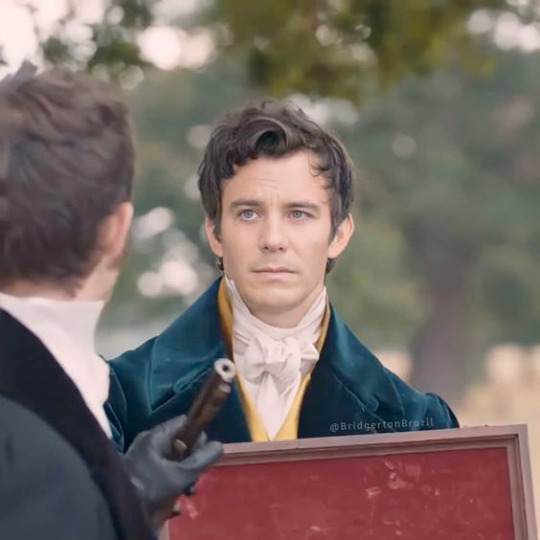
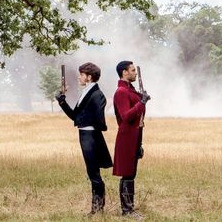
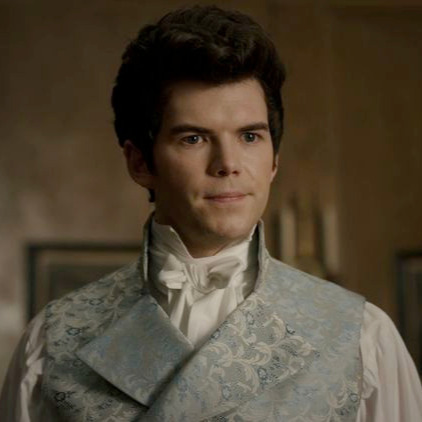
summary: the night before anthony and simon's duel from benedict's perspective.
warnings: angst, anxiety
a/n: wc: 546. this is a cut scene from ch. ii. of perfect all-american bitch, my benedict bridgerton x reader series where benedict becomes the viscount, but can be read as a standalone since this is a flashback sequence! despite how long the chapters already are, that's after i've spent a full day editing them lol, so i'm thinking of posting scenes that i've cut/would've liked to include in the main story but wasn't super relevant to the plot (like this one)

Benedict and Colin exited the study feeling about a decade older than when they walked in. Anthony had provided them grimly detailed instructions on what to do in both of the worst case scenarios. The two younger brothers congregated in Benedict’s bedchamber to go over the logistics one last time.
Colin was to remain on guard at the home. He would arrange for a hired hack to be at the house to transport Anthony to either the docks or the hospital. He needed to keep Daphne from interfering, their other siblings away from any violent sights, and their mother calm.
Benedict needed to contact the solicitor to secure their financials. They would need to give notice of either death or disappearance to the people of Aubrey village and to Parliament. They might have the Bow Street Runners called on them in a few days time. Benedict might have to arrange for the funeral and a casket and—
Oh dear, the room was spinning.
Benedict had been running through the list in his head for the past few hours, his cursed version of counting sheep. Colin was snoring on the bench at the foot of the bed, occasionally bumping against the frame.
Colin seemed a great deal calmer than Benedict. He seemed quite sure that the duke would yield, or that they would both fire their pistols wide. Perhaps, he was truly that optimistic, if a bit naive. But perhaps, he was only putting up a front. Because when Benedict suggested Colin go back to his own bedchamber once they were through, his younger brother had insisted he was too comfortable to move.
It was a bald-faced lie if he ever saw one. Colin was taller than Benedict, which meant his legs were scrunched up when he was horizontal on the bench. But he managed to fall asleep anyway, and Benedict draped a spare blanket over him before retiring to bed himself.
And truthfully, Benedict did not want to be alone either. If this was their last night of normality, he would rather spend it together than apart. He laid staring at the ceiling until the first streams of sunlight threatened to breach the inky sky.
It was time.
They made their way down to Anthony’s study. This would be Colin’s post; close enough to the main entrance to execute his tasks, but hidden away from the staff, and more importantly, their mother.
Benedict clasped a hand on Colin’s shoulder; he hoped the gesture came across strong and reassuring, but Benedict felt more like he was grasping onto a life-jacket.
Colin was still boyish, the baby fat not quite melted off his face, and looked entirely too young to be dealing with this. He mirrored his brother, also grabbing Benedict’s shoulder. “This whole affair will all be over in a few short hours,” Colin said with a small smile.
Benedict couldn’t bring himself to agree as it would be disingenuous. There was something peculiar in the air this morning, as hokey as that sounded. Something just wasn’t sitting right with him, but he couldn’t put doubts in Colin’s head.
He was the older one, so act like it. “The only way out is through,” he said with the solemn resolve to bring this business to an end.

why was this cut? as much as i liked exploring the relationship between colin and benedict (tbh i love getting the chance to explore any bridgerton sibling relationship hence why beneloise got a whole prologue), but 1. i was approaching a ridiculous word count and 2. it didn't entirely make sense for benedict to start the story from the night before.
taglist: @daddy-obrien @noirrose21-blog @loviyysev1045 @giuseppeverd1 @chauchirem @camilalexa93 @books-with-se @alexlovesfiction @dreamssfyre @czarinera @chris9683 @g4ns3y @kindbearqueen @mattelbaby @witchyvoman @ayidipinursue @fairyellieee @78-bratz-doll @simbaaas-stuff @starcollector13 @bonitoflakes071 @dallamdoll @2005priness @mythixlly @sickmarriedandying @takemeoutrose @boojaynaqueen @amaliarosewood @everybodys-favorite516 @abrose11 @bluelittleblackgirl @guppypuppy84 @mayalopes @how2besalty @reginageorje @aprilthearcher @5hundreddaysofsummer @niniackerman @bonjour28 @thebazil3 @answrr @quadrisl @livingvicariously1 @bitchyally @renintheszn @napollya @bitchfuckdotcom @imagandom @bugg06 @my-queen-rhaenyra-targaryen @cassiejpg @mrspotterlupinblack @jinx53 @naclara98421 @themeanestlittlewitch @dpaccione @rainybabe25 @mysticenvy @crazymar15 @scooper-trooper @universal-s1ut @fairyfelicitysmoak @tittiemama @rr1tualz @giulssmediobolud4 @pastelpunkpercy @ladybird-666 @sparky2020sworld @radstrangerdinosaur @lillyrosenight
if you weren’t tagged, check your privacy settings!
#bridgerton#benedict bridgerton#benedict bridgerton x reader#bridgerton fanfiction#bridgerton fic#bridgerton imagine#bridgerton netflix#bridgerton x reader#colin bridgerton#colin bridgerton fic#benedict bridgerton fic
37 notes
·
View notes
Text
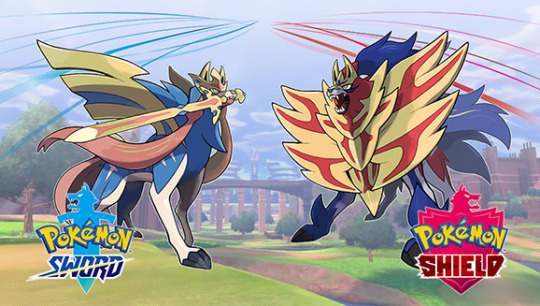
I feel like some of us have that region that isn't "for them", and Galar was DEFINITELY that region to me:
Like, the story was pretty boring thanks to the hyperfixation it had on Gyms. And then when something interesting would happen, Leon would show up and redirect you. I get what they're going for, he's their unbeatable Champion and it's nice he's getting involved with the affairs of his region, but it came at a downside. (I feel like Alder was better since the player still felt relevant to the plot, even tho he was pretty active and involved too.)
Most of the major characters just weren't utilized well, fell flat, or annoyed me (tho there's some I liked, like Sonia, Piers, and Raihan) Like, we FINALLY have a jerk rival after two decades, and he's forced out of the plot midway in (due to his own decisions, but still wanted more with Bede), and I think Marnie only really got as popular as she did because of her design, because she's kinda forgettable personality-wise. 🤷♀️ There's way more going on with Piers imo. Hop was ok, but I think they could have done a bit more with him. (Maybe if they had explored him growing up in Leon's shadow more?)
I feel like this is gonna be an unpopular opinion, but I just never vibed with Leon and the way the games and anime shilled him just always rubbed me the wrong way. He's not the worst Champion, that still goes to Diantha, but between how the games just use him to redirect the player and the character-shilling, I just kinda found him annoying. 😔 (I tend to not really like showboaty characters most of the time, tho there's a few exceptions like Alastor. I feel like if they got the charisma to back it up, I might end up liking them, but sometimes, it just comes off as kinda lame instead. Imo, the charisma is there more for anime Leon over the games version.)
The idea of minor League Gyms was neat, but we never really got anything with them until Klara and Avery. Like, we can assume Allister/Melony and Bea/Gordie were minor League depending on what game you play, but in the games they're not Gym Leaders, they don't even appear.
I also hated them forcing me into a Gym Uniform in-game for those battles/League fights. (Let me keep my drip, dammit.)
The villain plots ticked me off. I've already gone after Rose a couple times in this blog, but if the energy crisis had been a few decades away, I could understand the rush and frustration with Leon, but 1000yrs was way too big a window. The Royal Brothers are meant to be annoying and ridiculous, and they definitely hit their mark there.
The box Legendaries were the most boring duo for me (They're not Pokemon I dislike, they're fine. The other box Legends were just cooler. I like the more eldritch Mons tho, so I really loved Eternatus.)
The base game's wild area felt really limited and small once you find your way around. The Crown Tundra's was way better, not to mention Paldea's.
I didn't really care for the Dynamax gimmick. (I've always been a Mega Evolution guy tho. Gigantamax could be cool, I think I just like the alternate forms.)
I will say that the DLC improved quite a bit imo. I liked characters like Peony and Mustard, the exploration was an improvement and the quests were fun, and it was cool seeing the interactions between Gym Leaders and such in the Galarian Star tournament. They also get bonus points for bringing back two of my favorite Pokemon, Volcarona and Magnezone. (I also feel like the Galar-original Mons were pretty good overall, and same with the clothing options.)
But like, by the time we got out of Gen8 and into Paldea for everything (well, the games and the anime anyway, wasn't the biggest JN fan either, I still have to catch up on Adventures), I was so happy. Technical issues with SV aside, I've enjoyed Gen9 a lot more overall.
41 notes
·
View notes
Text
Queequeg's lack of autonomy: features or bugs?
You know, I wanted this to be a proper analysis, but the stressed, sleep-deprived, busy self can only do a semi-ramble, semi analysis.
So I said how Queequeg's lack of autonomy and individuality is not a bug, but a feature.
Just so we are on the same page, I will prove how Queequeg is very obviously lacking in autonomy:
Queequeg: Must be nice. Queequeg: Knowing what you want. Knowing what you desire.
Canto V's dungeon: Floor 2
No… You devoured the crew whole. You painted over their wills, just like the Whales— no! Just like the Pallid Whale! Molding them and shaping them to fit your wants and needs.
Canto V's dungeon: Floor 3
Queequeg: Too late to think. About what is right and what is wrong. To think for myself. Too late.
Canto V's dungeon: Floor 3
The whole dungeon, she was obeying Ahab's orders, getting dragged around and around. Utterly lacking in agency is her main characteristic in her Pequod time, but there is a case to say it wasn't so during her Middle-arc. After all, she did say:
Queequeg: So I killed. And killed. And killed. Not because of orders. Killed with my own hands. Because I wanted to. Because I wanted respect as Big Sister.
I don't doubt her words. However, tribalistic as the Middle is, I think we can speculate on how much of Queequeg's actions stemmed from her own desire, and how much was her complying to its culture without even knowing it.
Either way, even if you disagree that Middle Queequeg was lacking in agency, it's hard to argue that she wasn't in her Pequod times, so we can assume that is a major trait of hers.
Let's go back to The Little Mermaid by Hans Christian Andersen for a sec. I will assume that you are convinced that one of Limbus Queequeg's inspiration is The Little Mermaid. If you are confused with that statement, please read:
The Little Mermaid wants to seek an immortal soul by getting the prince to marry her. I think it is a misconception that she did all (abandoning her family, enduring pain with every of her steps, sacrificing her voice) for love. No, she wants more than that: she wants an immortal soul. There could be a religious reading here, but it is neither relevant to my point nor am I qualify to state it, so I'll leave it. However, one could see how the arrangement of a woman having to win the love of a man and devoting her entire self to him to attain her spiritual fulfillment is very unfair, misogynistic, even. (Unfortunately, I can't explore that theme in Limbus Queequeg's story because sexism apparently doesn't exist in the City and also there are no prominent men in her story either?)
Here, I can go on about traditional heroines and how they are mostly quite lacking in agency too, but I haven't done researches for that. And more, importantly, this trope was intentionally subverted in The Little Mermaid. Hans Christian Andersen is much smarter than me, because he wrote it.
The Little Mermaid isn't just a damsel waiting for someone to save her. Her two displays of her agency are 1. finding the Sea Witch to get a pair of legs and 2. not killing the prince. She has a goal (attaining an immortal soul) and a principle (her love for the prince?) that she holds steadfast. Unfortunately, the one thing that she has been after, the prince's love, is not something that she can control. She can try to seduce him, sure, but his affection is his own. And, without it, she can't get an immortal soul...
But that isn't true, is it? The Mermaid didn't just die and turn into sea foam, fated to never get her immortal soul. She became a daughter of Air. And, with enough good deeds, can gain her own soul. Fortunately for her, this time, the task of getting her soul depends much, much more on herself.
This writing choice is quite intentionally, I believe. I wanted to read more about it, I really do, but the link they cited on Wikipedia led to an Internet Archive article that has been downed (RIP). Anyways, the gist of it is Andersen took inspiration for The Little Mermaid from Undine, in which a water spirit indeed got her immortal soul by marrying a human knight. Anyways, this is what Andersen allegedly wrote to a friend about it.
I have not, like de la Motte Fouqué in Undine, allowed the mermaid's acquiring of an immortal soul to depend upon an alien creature, upon the love of a human being. I'm sure that's wrong! It would depend rather much on chance, wouldn't it? I won't accept that sort of thing in this world. I have permitted my mermaid to follow a more natural, more divine path.
The point, I think, is that the Mermaid doesn't really need the prince's love to gain an immortal soul. That is something she can obtain herself, what she deserves after so much sacrifices, the rewards for her virtues. After the Mermaid was at the mercy of the prince for half of the story, she was given a chance to do good by herself. The opportunity of attaining an immortal soul returned to her.
I just argued above that Queequeg doesn't have autonomy, maybe even from her time in the Middle, but I lied (again). Queequeg also has two acts of agencies her own 1. running away from the Middle and 2:
Queequeg: Dante. Something I wish. Queequeg: I want… Ishmael to… Queequeg: … find her way.
Canto V's Dungeon: Floor 2, and

Woah, those two acts perfectly match the Mermaid's too, wonder how did that happened.
That was Queequeg's only wish, and that was just a bit after she said she was jealous of the Abnormalities for having wishes too :D
Queequeg also got her immortal soul, but...
This is when I think the story falls flat, if you hyperfocus on her. And you...shouldn't have. She is an NPC, who is dead. Only weird nerds like me would analyse the story in her perspective. This is not really a criticism for Canto V or PM's writings (although I do have a problem with it sometimes). I think they did the best they could to flesh out and gave Queequeg a proper ending with the little screen time she got (unlike that one other dead NPC from another franchise that I used to hyperfocus on).
However, what did The Little Mermaid have to do to get her immortal souls? She has to do 300 years worth of good deeds. Even though we didn't get to see it, we can assume that she struggled and grew even more to attain her goal.
What did Queequeg do to get her immortal soul? Um...uh...
Queequeg didn't really grow in the quest. When reunited with Ishmael, "her broken heart" got "unearthed". She nurtured a wish for herself: for Ishmael to find her own path. But, ultimately, she was still...following Ahab's orders. We still have to fight her twice (and thrice if you count her EGO phase).
Queequeg had character developments during her time on Pequod (mostly with the influence of Ishmael). She learned to look forward and to have hope. That got rolled back.
So, essentially, Queequeg got rewarded for...nothing?
Her story has ended. She couldn't do anything to actually gain her immortal soul, her atonement anymore. She is still quite lacking in autonomy. And I think that is a real shame, a bug, even.
That is one of the reasons why I made that swap Ishqueg AU.
______________________________________________________________
I know characters lacking in agencies are often seen as bad written, and a lot of times, they are. However, there is a certain charms to characters who have been deliberately written to have next to 0 agency. This actually reminds me of Iwakura Michihiro from Genshin Impact, an actually pretty prominent NPC in Inazuma's lore, whose only 2 acts of agencies in the lore were 1. leaving home to live in the woods (this one is debatable because he was abused and perhaps driven from home would be a more correct term) and 2. naming his sword. Anything else he did were instructions from his bully/mentor/friend/crush/saviour. And also Carter Scherbius, another NPC from Genshin Impact, who was terminally ill and then turned into goop in an effort to save him and later reincarnated for an experiment.
There is something quite heartbreaking and even beautiful about seeing a characters being dragged and beaten by the narrative. It's relatable. Real people, we, don't usually have control of our lives most of the times. We are dragged around and the beaten by forces we can't understand. We are usually helpless against our fate.
And, what kinds of people who would usually feel helpless against the sheer incomprehensibleness and the cruelty of our vast world? Sailors.
#lcb ishmael#limbus company#project moon#lcb ishqueg#lcb queequeg#analysis#queequeg#ishmael limbus company#rambles
14 notes
·
View notes
Text
Journal of a Questioning Otherkin (Entry 2) (Repost)
This morning I woke up and immediately was hit with a massive amount of dysphoria. It was as if every fiber of my being was screaming with the pain of being confined inside of the wrong body. I just felt awful in a way that is almost impossible to put into words. My skin was crawling because something inside me just knew that this skin was wrong. I felt wrong. It really hurts, mourning a body that I know I'll never have.
The dysphoria hasn't been quite this bad before. All these years I've suppressed the feeling deep down inside of me, pretending it was fine, but now that I finally see it for what it is, I can't pretend anymore. I can't just ignore it and hope it fixes itself.
I started to dissociate due to how bad I was feeling and I wasn't able to think, or really do much of anything for the entire day. The brain fog was just that severe. I realized that this brain fog and dissociative spells might have been affecting me for years and I hadn't even realized that's what it is.
I really need to figure out how to cope with that feeling of dysphoria better, because I really can't afford to spend every day in a dissociative haze, riddled with anxiety, and unable to get basic tasks done.
I am struggling and I don't know what to do. I'm so new to all this. How do you connect to your kintype? What does it mean to be a pokemon? What does it mean to be an Umbreon? How do I figure that out, and how can I help alleviate that all encompassing dysphoria? Right now it feels hopeless, but I know logically that isn't true.
On a different, less depressing note-
In an attempt to explore more about myself and to distance myself from the concept of being human, I decided to try out it/its pronouns. I had an interesting experience with that, but my findings were largely that it didn't feel euphoric, but also, it surprisingly didn't feel bad either. Perhaps there is something there, but as of yet, I don't quite know. Trying out Bre/Bre's/Breself was actually kind of nice too.
I've never gone by any pronouns other than he/him before, so this is new to me. If this ends up developing further, I could potentially see using He/it/bre. The dehumanizing aspect of it/its is nice, but I still strongly feel connected to my identity as male and don't want to discard those pronouns.
I've already done my soul searching in regards to gender, and I'm confident and comfortable identifying as male, despite being very gender non-conforming. However, that's neither here nor there at the moment.
And ending on a little funny note, a friend that I haven't talked to at all about any of this identity fuckery sent me this today. My friends send me Umbreon related posts because they know I like Umbreon, but I found it hilarious and ironic that they sent this to me and had no idea how relevant this really was to me right now.

Anyways, long story short, today sucked. Dysphoria hit so hard that it caused a full day of dissociation. I still feel very good about being an Umbreon Fictionkin, but I'm doing my best to be open and considering possible alternatives. I try not to fall victim to confirmation bias.
Any tips from otherkin (especially fellow pokemonkin) on how to handle dysphoria and connect to your kintype would be greatly appreciated! Until next time.
#otherkin#fictionkin#therian#therianthropy#theriotype#kintype#eevee kin#pokemon kin#alterhuman#alterhumanity#pokemonkin#pokekin#pkmnkin#eeveekin#eeveelutionkin#umbreonkin
24 notes
·
View notes
Note
aita for ruining someone's "illusion" when i refused to continue rpf roleplaying with them?
this is something that happened years ago and that recently became relevant again because i crossed paths irl with this person and they still haven't forgiven me.
i (now 32 trans masc, when this happened i was in my 20s) used to be active in rpf roleplay circles. i wasn't popular because the famous person i roleplayed as had more of a niche following. unfortunately, this meant that fellow fans found my blog and followed me, and also started interacting with this roleplay blog as if i was "the real deal" just for the fantasy of interacting with their favorite artist.
i originally didn't really mind, since i was using rpf as a way to explore my own gender and my ideas of masculinity, and this famous person was someone i truly looked up to and wanted to emulate. the attention helped me practice my words and the way i formed my sentences, and also helped me get into a "masculine" headspace (i don't know how else to describe it).
the main issue arose when one of these fans got really invested in both my rp and personal blogs and stalked me even as i took mental health breaks from rp and stopped using tumblr for a while (would still use my personal twitter/ig accounts). they would constantly send tons of asks and fanmail (remember when we had that?) talking to me as if i was the actual artist, and they would send TONS of risque comments/dms to my personal accounts.
at first i tried to be understanding, but when this person started talking about their fantasies to me, both featuring me and the artist, i sent them an ultimatum that basically said "enough. i am not x. i don't want to read this, and x would not want to read it, either. i don't want to know about your fantasies. i'm not doing this anymore" (but admittedly more aggressively).
this person complained about my reaction when we crossed paths recently, saying that i was rude and disrespectful to their fantasies and that i made them feel insecure about their sexuality to the point they struggle talking about what they want with their partner.
and i can admit that sucks, but i am also torn, because while i'm mostly sure i wasn't in the wrong to react like that (and to quit rp altogether after this experience), maybe i could've handled the situation better.
(also, i'm not interested in opinions about rpf and whether it's right or wrong. i just genuinely want to know if i'm the asshole for reacting aggressively to someone telling me their sexual fantasies about me when i never engaged in erp or posted anything sexual either ic or ooc. if i am the ah, i'd like to know how i can make it up to this person.)
What are these acronyms?
84 notes
·
View notes
Text
i will be the first to admit that this might be reaching a bit. also discussions of religious concepts in lgts ahead
so catholicism in lgts is explored through the struggles of living in a small catholic town like kieferberg, and literally everything about walpurga, the forest deity turned saint. but imo there's also something to be said about how elise obtains the tender flesh: this might be a reflection of the sacrament of the eucharist as understood during the medieval era.
but what is the eucharist anyway?
in catholic doctrine the eucharist is supposed to be the body of christ manifested through transubstantiation: the transformation of bread and wine into his flesh and blood respectively. this is based on the events of the last supper in the bible, wherein before his death jesus offers his body to his disciples through the bread and wine that they share. thing is, current understanding of transubstantiation is moreso in a metaphysical sense: catholics who do believe in it don’t actually think that they’re eating jesus’ physical body.
that wasn't always the case with medieval catholicism, however. there were theorists like st aquinas and berengar who argued for a metaphysical transubstantiation, but powerful church officials like cardinal humbert (who actually forced berengar to recount his claims) also believed that the faithful partaking in the eucharist were actually eating the literal, physical flesh and blood of jesus. there was quite a bit of concern too because of this: the body of christ, torn apart and chewed on by not just the faithful, but potential sinners?
the average catholic of that time probably didn't care much for the specifics of how transubstantiation worked (either way, the bread is/represents jesus, whether or not that was physical or not), but the point is there was an ongoing debate—if only among high-ranking church officials and theologians—about what the eucharist really was. now keep in mind that aforementioned literal physicality of the eucharist, and how similarly that plays out to the relevant witching hour segments in lgts.
i want to first highlight the scene where the crows in murim's domain rip out parts of elise's hair for the wheat testament:
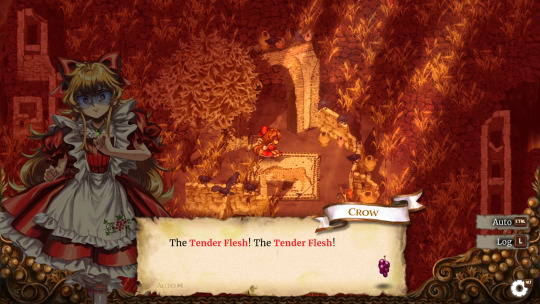


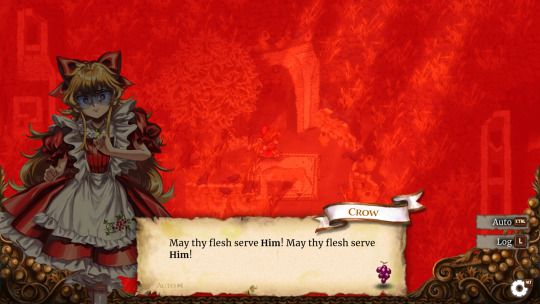
and the aftermath:

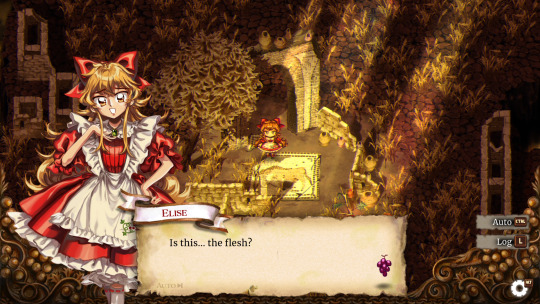
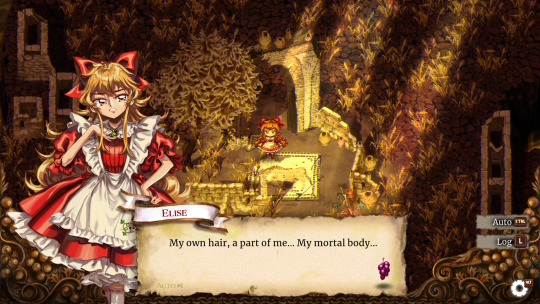
they sure are hungry, huh? and the way they get at elise is pretty violent, judging by her screams and the sounds of tearing flesh. their carnal hunger, expressed through their lines and the violence in how they form the wheat testament from her hair, brings to mind similar fears of an animalistic, near sacrilegious ingestion of a certain sacred body turned bread, only this time realized in a demonic trial. in other words, the entire trial subverts christ's supposed physical presence in the bread. besides, it's stated outright that elise is meant to physically combine a piece of her body—her hair—into that wheat.
she does just that in the windmill:
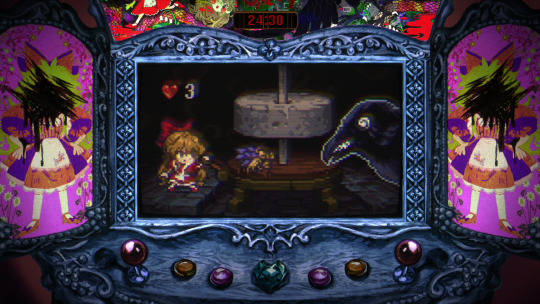

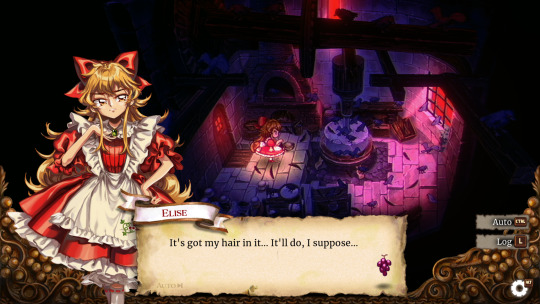
her hair baked into the (apparently unleavened) bread is the tender flesh that the crows hungered for, that would eventually find its way onto ozzy's table.
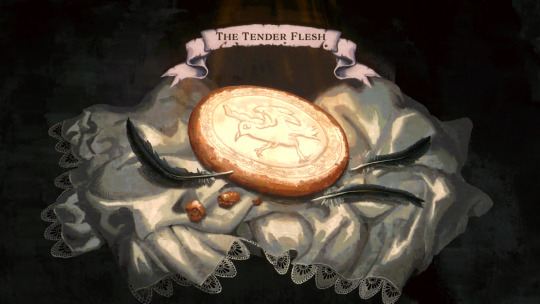
so the process of acquiring the tender flesh seems to imitate that transubstantiation in the celebration of the eucharist. if that's the case, i wonder why ozzy and his minions would design them this way…
btw here's my sources for medieval transubstantiation (despite my unhinged rambling i did do a bit of research):
https://www.jstor.org/stable/23964057 (Ego Berengarius by Chadwick, H., 1989)
https://global.oup.com/academic/product/some-later-medieval-theories-of-the-eucharist-9780199658169 (Some Later Medieval Theories of the Eucharist by Adams, M. M., 2010)
#little goody two shoes#lgts#elise lgts#father hans' study#considering that the game takes place from the pov of someone who's not a fan of the church#which considering that it's kieferberg is understandable#it's interesting how readily she throws herself into what's basically a subversion of one of catholicism's most central sacraments#and to her credit she does technically get what she wants#even if it is a monkey's paw#it gives me Feelings#haven't analyzed the sweetest nectar in connection to this yet#but there are some parallels i feel#or similar functions#as the wine accompanying the bread in the eucharist#so the sweetest nectar—which does look like red wine and is made from a mixture of blood and water—accompanies the tender flesh#definitely did not plan on posting this during holy week no not at allllll
30 notes
·
View notes
Text
veilguard impressions
spoilers ahead. a list of my opinions and impressions as I play this game
basic starting notes after having played for 30+ hours
overall I am having fun playing this game
there are things I like and things I don't like. these are subjective and I don't think everyone is going to share these opinions or agree with me
I am not going to give an overall opinion of how much I liked it until I've finished playing
things I like so far
the way the characters look. I do like the character design style quite a lot
seeing characters from the books and stories: the crows from Tevinter Nights; Felassan from The Masked Empire; Maevaris from the comics and Tevinter Nights
the look of returning characters that I've met so far. I honestly think Dorian looks FANTASTIC. I do wish Morrigan and Isabela looked a little bit older in their face textures, but overall I love the look. (For Morrigan I'm also willing to let it go by imagining she can magic the subtle signs of aging away or something like that)
exploring scenes from Solas' past in the Crossroads
the Portal-style open-the-way-forward puzzles are fun because they're new (not sure how they'll hold up on multiple replay; could become annoying, I imagine)
that Rook has a unique conflict in their backstory, based on faction, and other characters mention and react to it. it feels like a solid way of rethinking the playable origin-story from Origins
the continuity with DA2 in having Varric as the narrator, speaking over beautifully illustrated backgrounds during some transitions
the continuity with Origins in having cutscenes of the antagonists play during transitions
combat related: I like the chained moves being mapped to buttons; I am still getting a feel for them; I imagine it would be harder if I didn't have an xbox elite controller with paddles, mapped to the ABXY buttons in addition to the buttons themselves
combat-related: using the bow is pretty fun. I never like archer builds, but I'm enjoying rogue plus bow a LOT. the smooth transition from blades to bow and back is great
not as much inventory management: I have spent plenty of my gaming life customizing swords while comparing them to every other sword in my inventory. I'm okay letting this stuff get simplified for me
Dorian DOES know Emmerich previously, a fellow necromancer, and I appreciate that!
Mae having been kicked out of the magisterium and the Lucerni disbanded a year before the present, and Dorian being the magister on the inside for the Shadow Dragons. That played out in a way that was pretty close to what I anticipated based on what we know of Tevinter politics
things I dislike so far
some of the companion conversations feel like they've been workshopped for a generation that's much younger than me — which is fine, but there are some things the characters say to each other that strike me as... well, YOUNG, and not the kind of dialogue I'd write if it were me
I'm also ready for varric to step aside as a character in game. while I appreciate his narration, I'm finding his pep talks and advice to be a little grating. though, depending on how I feel at the end of the game, I might find some fanfic inspiration in this feeling, so I'm actually not salty about it, just noticing my own reaction here
I'm finding I choose characters to accompany me based on who can prime and detonate the specific combat moves; and that feels limiting in a way that I wasn't expecting. I often pick one character who feels relevant to the mission, then default to whomever can prime or detonate for them
I totally missed the "customize your Inquisitor" side panel at the start of the game. disappointed enough at having generic FLavellan show up that I quit my first Rook and am now replaying on story mode to catch up to all the time and plot I lost
things I haven't formed a full opinion about yet
the combat overall. it is VERY different from all previous games, and I'm honestly not even comparing it to previous titles in the series because it is a whole new thing. the dodging and chained moves remind me of Elden Ring, but I find Elden Ring combat is more satisfying for me. the explosions and pacing remind me of the Borderlands franchise, but Borderlands was also more satisfying for me. I don't love it OR hate it. I'm kind of in the middle, I guess. Though, like I said, I'm fond of the bow
the Veil Jumpers. (I chose this background with my first Rook before I quit to replay.) I think I get what the writers were going for. Solas unleashes some new weird shit and the Dalish start checking it out and then recruiting more people to investigate. that feels reasonable to me. also, even though the mood is cheerful, it's clear a LOT of them are dying. I appreciate that because they are running around poking at unstable magic and malfunctioning old relics... but yeah, the cheerful mood and the "can do" vibe feels a little off to me in a way I'm not totally sure how to explain. it's almost like the writers realized the past games had written the Dalish into a really weird corner where they were "stuck in the past" but also uneducated about so much of their own history. and now they are trying to remake them into a newer, more "fun" group of people. it's just... a thing I notice
the choice between Minrathous and Treviso. I haven't seen how this plays out in the endgame yet, but I'm expecting a break or betrayal from Lucanis after choosing to fight with Minrathous instead. (I was planning to romance Neve with my first Rook, so that choice seemed important; I'm going to make the same choice with my remade Rook, as a Shadow Dragon whose home is Minrathous) So... yeah, I'm kind of hoping Lucanis will unleash an unholy mess upon us based on that choice. It feels very Mass Effect, but if the Virmire survivor lived and was changed by the experience of being abandoned by Shepard. I am hoping it goes poorly in the later part of the game, but you know, we'll see...
companion characters. I am reserving judgment until I've finished the game and of course I've spent more time with some than others due to the recruitment timings. at the moment I'm personally most fond of Neve, Davrin, and Taash (though I just met Taash, so will need more time to solidify that opinion. I think she's going to be my remade Rook's romance instead of Neve). I like Lucanis; he doesn't feel like a personal favorite, but I like him. Harding is fine; overall she's a bit too sunshine for my tastes, but I like her well enough. I will probably like Emmerich more as I continue to play. I feel like I just met him. Bellara is the one I'm struggling with most, but I think that's connected to my mixed feelings on the Veil Jumper faction in a way I haven't figure out entirely yet
the story arc overall. I don't have a handle on how I feel about what's happening and so I'm reserving judgment on until it I've completed the game for the first time
8 notes
·
View notes
Text


Feeling such a difficult-to-succinctly-describe set of emotions with this. I've been into Love Live for nearly 8 years at this point. It's been a series of ups and downs, can't deny there have been times where my passion for the franchise has wavered, but I hold the franchise as a whole very near and dear to my heart. When I got into Love Live, School Idol Project was already past-tense, Sunshine was awaiting its second season, and the "spinoff" series then known as Perfect Dream Project was in its infancy, but very much still existed.
Superstar, then, was the first part of the project that I got to experience in real-time as it was brand new - to look at that first street visual and pick out which girls had enough of a character design to be part of the group, to hope for some such group names to win and other group names to definitely lose, just to completely invest myself in, really. It was exciting seeing the next main series in the franchise begin, you know? All of this plays out, I latch onto Chisato, I eagerly anticipate their songs and their music videos and most especially their TV anime. And hey, that first season was great! Quintessentially Love Live distilled down to a pretty perfect execution, the only real problem being a surprising lack of ambition and not exploring its cast as thoroughly as it should've. I genuinely appreciate the 5 girl structure - previous groups have definitely had more and less fleshed out girls as some are relegated to gimmick character traits. 5 felt like a refreshing take that would give each girl further time to shine.
And then yeah, we know where the story goes. Season 2 comes out, and I just find it such a painfully mixed bag of a season. The exact fear was realised - it's not just that there are 4 new girls, it's that 2 of them are insanely hardcore gimmick characters, 1 of them is basically a sidegig for one of the gimmick characters, and then Kinako is fine actually. And it doesn't stop there, because new antagonist force Wien Margarete is here too, to just yell and be stubborn and only ever interact with Kanon. The entire season moves at a snail's pace because basically nothing happens except when Kanon and Margarete are on screen together, but that's a minority of the runtime because we need to see Natsumi try to go viral. It was a painful watch, and in a very real way shot down my hopes of Superstar really being all that good when I genuinely don't like nearly half the cast by volume now.
That was all over 2 years ago by now. There's been a lot of Love Live since then, although the only truly long-form thing was Genjitsu no Yohane, which was like ultra spinoffy such that like what do you want me to say lol. I don't feel like I've engaged with actual serious Love Live in a long time, the wait's been that long. Let alone Superstar, which is the branch of the franchise that's... not quite sure what word to use here. Most relevant? Most interesting? Least predictable? Like it's not the one that's my favourite but I suppose it's the one that feels like it holds all the future potential, or something. Anyway. I don't even know how to reflect on those 2 years anymore. I didn't like seeing people call Superstar shit now or automatically hate the new characters but also I didn't exactly like season 2 and you could axe the entire new cast and I'd be happier for it. I didn't like s3 pessimism but also I wasn't exactly eager for it either. I wanted to, and still want to like Superstar.
And all of that brings us to today. Episode watched, SubsPlease used because I wanted webvideo instead of a TV rip. The OP was genuinely beautiful, I'm really glad I'll get to hear it every week. The ED was comparitively lacking, I'll admit. We've still got Liella no Uta each time though which is always fun. Still looks fantastic, still sounds really nice. No new songs this episode aside from OP and ED but I mean it's Love Live like I'm expecting good shit.
The episode itself... I think at best I'd call it good in spite of itself. There's this whole thing with Love Live antagonists and joining the groups they're antagonising where it can feel artificial because we've seen the OP like we know the full group size, but I mean I'm not that level of petty or plot-brained like I'm happy to see the conflict play out. Margarete is... eh? For a conflict running on from the last season I don't think we've seen enough of her to be sympathetic, she's kind of just a brat. But then Kanon is our perspective character and is trying to understand her, and that's cool, right? I like her justification for moving away from Liella and working with Margarete and her eventual group too - I think that's a good opportunity for growth on both sides and they didn't do it in like a really overdramatic way that results in dumb conflicts where characters aren't just talking it out. Like it works, is the point. It's just that for all that, I'll still see Shiki on screen with her stupid steampunk goggles and get annoyed. I think I can like this season, I'm open to liking it, I have some fondness for what we've had in this first episode anyway. It's just the direction season 2 took is so hard to... I guess reconcile. I don't know. We've got 11 more weeks of this. Let's see what happens, I suppose.
5 notes
·
View notes
Text
Vessels of Hope and Faith: more on the Blue Clues and the Venus symbolism
Sometimes you'll have these thougths and connections simmering in the back of your mind for years, but you don't know how to articulate them into something that sounds coherent.
And then new content comes out and there's a shot that unlocks a Pandora's Box of new theories and correlations.

Yesterday I tried to explain the significance of the blue bird symbolism and its connection to the 101 symbolism. I started researching all kinds of blue bird symbolism after Noah's T-shirt theory was confired all those years ago, and I found a few connections that seemed like they were obvious choised for tptb to utilize, and yet, tptb took their sweet time in confirming they were indeed real, actual connections. The connection between the yellow school bus brand Blue Bird was one of them. We have seen yellow school buses multiple times, some were indeed Blue Bird buses, others weren't necessarily easy to decide, and it wasn't always clear to me if a yellow school bus in an episode was a Blue Bird, and if it was meant to be read into as a part of the symbolism language, or if it was just a random coincidence.
And then, in TWD: Dead City 1x5 Stories We Tell Ourselves, we got the scene that confirmed that yes, the yellow school buses were indeed an integral part of the Blue Bird symbolism seen on the show.
Another blue bird reference I've been anticipating for years was the Crowned Victoria Pigeon. I always thought it was an absolute travesty and missed oppertunity if they didn't use it as a symbol, because it is absolutely perfect for the symbolism language they're already using. And in the episode "Amy/Dr.Everett" in the spin off series Tales of The Walking Dead they finally did. Here's a review on the episode in which it appeared.
"They come across a moment of beauty: a colorful Victoria crowned pigeon. Once on the verge of extinction, the bird is beautiful. "You're alive," Amy says. "You're right here." Amy's marveling turns to heartbreak when the bird flies away."
Sounds a lot like this blue bird is about resurrection. It's on the verge of extinction, and yet it reveals itself for Amy in the episode. And like we often see with symbolism in the spin off's versus on the main show, ot's a lot more over-stated. It's in-your-face type of glaringly obvious. "You're alive"? Come on! If that's not resurrection symbolism I'm eating my hat.
In my Trunk Resurrection 1 and 2 posts from a few years back I elaborate on cars and what they tell us about the subtext of a scene. I also touched on it yesterday, mostly because one of the spoiler pics from the filming outside the Louvre possibly involves a Jeep Cherokee (which I explain the relevance of in Trunk Ressurection 2) (and at this point this is only wild speculation on my part, nothing is confirmed) . TD has also tracked licence plates for years, which deserves a separate post so I'll leave that out for now, but it is relevant because it ties into the car symbolism.
So, anyone familiar with the Trunk Resurrection posts will understand why I was patiently waiting for a Crowned Victoria Pigeon reference, especially when I tell you that the police car Rick and Shane use in the car chase that goes horribly wrong in TWD 1X1 Days Gone By is a Ford Crown Victoria. The car was quite literally the first thing we saw in 1x1 Days Gone By.
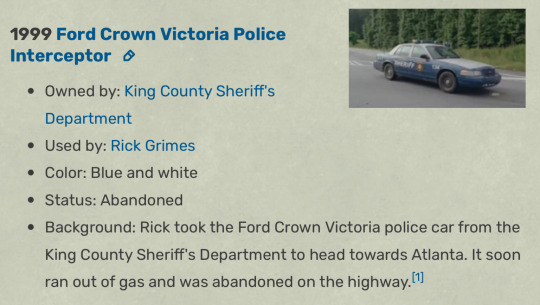
From a symbolism language standpoint, Rick's Crown Victoria police car in season one ties into almost every symbol I'm tracking on this show. It's a car, which means it ties into the Three-Tree-Trunk theory (Trunk Ressurection 1 and 2), it's a police car, which means it ties into the Blue Clues theory, and we saw it in TWD episode 1 season 1 (which I talked about yesterday in relation to the 101-1x1-one one-symbolism).
TWD: Daryl Dixon episode 1 season 1 was wonderful in many ways, and symbolism-wise it was a treasure trove. I have so many thoughts it's difficult to decide which trails to explore first. Yesterday I touched on some stuff that I want to elaborate on here. It deals with the same stuff, but I'll try to tie it together some more, and mention a few other exemples that I find relevant. I mentioned the Venus and Sirius symbolism yesteday, and I'll continue to elaborate on that today.
Let's start with the opening minutes of 1x1 L'ame Perdue. We see Daryl, unconcious and resting on top of an overturned (inverted) boat (or shall we say VESSEL?), wash ashore on a French beach.
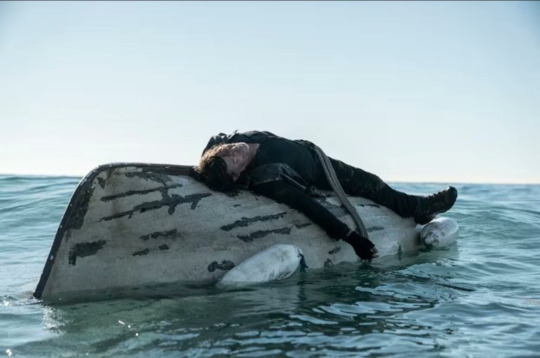
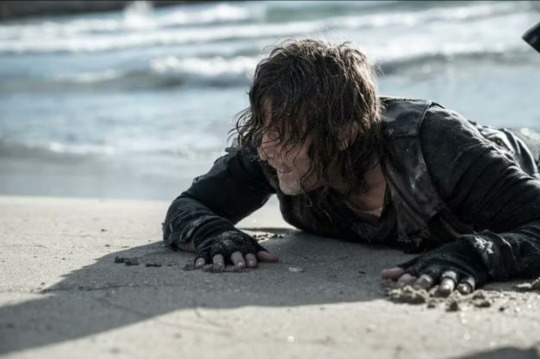

This little sequence of events sparked a chain reaction of lightbulbs firing in my brain.
For starters, all I could see initially was this:
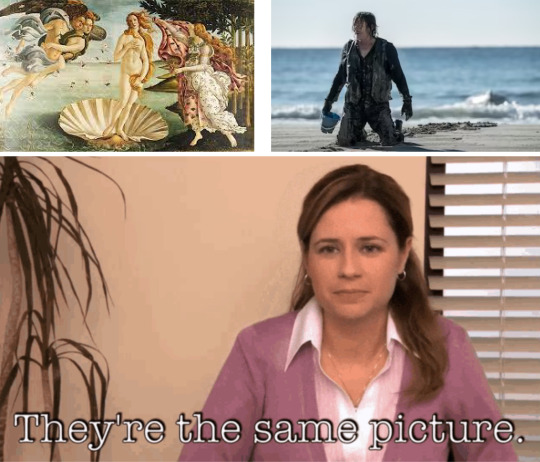
We saw the painting "The Birth Of Venus" in TWD 7x3 WTDCK, and it was inverted. I've said it before and I'll say it again, @angelthefirst1 had an absolutely brilliant breakdown of the symbolism in TWD 10x18 Find Me, and she very cleverly was able to tie it to WTDCK. I think that's super relevant because Find Me, polarizing and divisive as it was, for me was one of the most magical episodes of the entire franchise. I thought it was absolutely saturated with "underworld" symbolism in every single scene, it was as though the veil between the Realm of the Dead and the Realm of the Living was particularly thin, and in my opinion it had a lot in common with Still and Alone in that respect. For someone who loves underworld themes and themes of liminal spaces between the realms of the dead and the living, it was pure magic. I even kind of liked Leah.
(A quick note on the name Leah, because I have zero self control when it comes to these things... For me, who's already primed to pick up on anything remotely underworld-coded...I wouldn' be true to my soul if I didn' put it out there that the name Leah is an anagram for Hela, which is the Norse goddess of Death. Hel in Norwegian, Hela in Swedish. Yeah. That's a hill I'm willing to die on. Leah was TWDU's Goddess of Death, Monarch of the Underworld. And I love that about her...ok, back to the regular scheduled programming)
In WTDCK, where we saw the famous Bottichelli painting, we could see that it was inverted. The painting depicts Venus, the Roman version of the Greek goddess Aphrodite, arriving onto the shore, aided by the wind gods, in a vessel that is also a sea shell.
In TWDDD 1x1, Daryl, with the help of the wind and ocean currents (I guess), reached shore on top of a vessel that was an inverted boat.
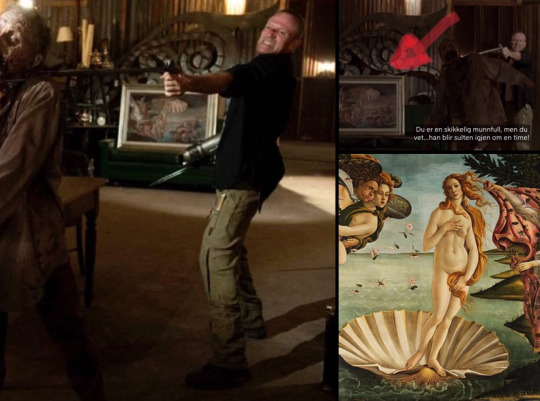
The painting is widely interpreted as to be dealing with themes of "rebirth", which @wdway had great insight into when I discussed this scene with her. When watching the opening minutes if TWDDD 1x1, where I saw the scene from Botticelli's "The Birth Of Venus", which is about "rebirth", she saw themes of baptism, which is ultimately also about rebirth.
When speaking of a "vessel", we are obviously normally alluding to a boat, or even vehicle, something meant as an instrument of transportation of some kind. But "vessel" can also be used about something which holds beverages, such as a "drinking vessel".

And as soon as we started down the rabbit hole of "drinking vessels" it was unavoidable that we eventually ended up discussing "Holy Grail" symbolism...
...which is something we've discussed a lot because of all of the thinly veiled references to the book and movie The Da Vinci Code we've seen in TWDU for at least the past seven years...
...which in turn is increasingly becoming interesting again, seeing as we keep getting spoiler pics of filming currently happening in and outside the Louvre. For those who aren't familiar with the book and film, here's a spoiler: the Holy Grail turned out to be the tomb of Mary Magdalene, hidden underneath the inverted pyramid under the glass pyramid outside the Louvre, where TWDDD are filming as I'm writing this. And there's more; the actual, real Holy Grail in the book wasn't so much Mary Magdalene herself as it was her womb, which in the story had carried and given birth to the child of Jesus, and one of the symbols of the female womb is a V... a reference to the shape of a uteris... Basically in TDVC the Holy Grail was the Tomb of the Womb. Or perhaps the Womb in the Tomb.
@wdway was kind enough to dig up her copy of the book and send over these convincing pics of the part in the book where Robert Langdon, the main character, and Sophie Neveu (spoiler alert: a direct decendant of JC himself) discuss the same symbolism I've just discussed above.
The female symbol:

Thanks @wdway, you're a star and an absolute legend!
Fear not, I'm not going to do a full synopsis of TDVC here, besides it's @wdway who is the real expert on these matters (she's been talking about chevrons for years). Go read it yourself, it's quite captivating. But for what it's worth, it does seem clear that someone in the writer's room in TWDU are more than just a little intrigued by the symbolism presented by author Dan Brown. And they're not afraid to use it in TWDU, because TD has consistently been tracking this type of symbolism since season 5 when Daryl paused in front of the carved wooden reproduction of Da Vinci's The Last Supper in Father Gabriel's church. Probably even before that, I have memories of TD'ers theorizing that Beth and Daryl's "white trash brunch" in 4x13 Alone was their "Last Supper", and that their kitchen scene was actually choreographed and modeled after Da Vinci's famous fresco.
And again, I'm bringing it up again because the writing of TWDDD 1x1 is practically forcing me to. That, along with the abundance of glorious spoiler pics from the Louvre...
Anyway, like the symbolism around the Blue Bird school buses and the Victoria Crowned Pigeon I mentioned initially, there are another few symbols I've been silently tracking over the years, and they both tie into the shot of Daryl stumbling out of the water, onto a Mediterranean beach, like a beautiful, though somewhat thirsty Venus or Aphrodite...

He finds a bucket of fresh water, and drinks it like his life depends on it (which it probably did, to be fair). And it's blue. Of course it is. A blue drinking vessel for our dehydrated but very much still alive Venus/Aphrodite...
My favorite method when it comes to researching symbolism revolves around etymology, first and foremost. Etymology is my go-to for everything symbolism related. And of course I've checked the etymology of the word "vessel" a long ass time ago.
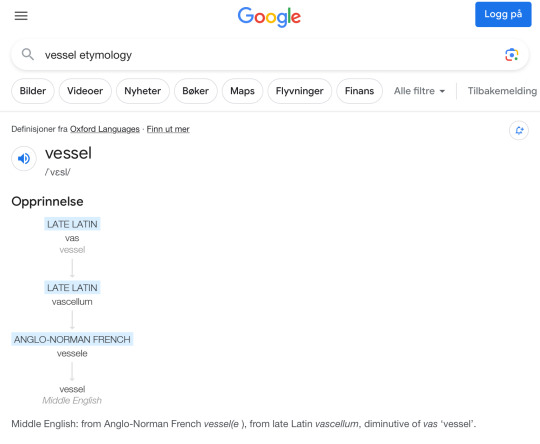
How peculiar, the root word for "vessel" is "vas". And I'm not gonna lie, the results were interesting because OF COURSE I've also checked the etymology of the word "vase" a long ass time ago...

..and the reason for why I checked the etymology of the word "vase" back in the ancient times of Really Early TD was obviously because...
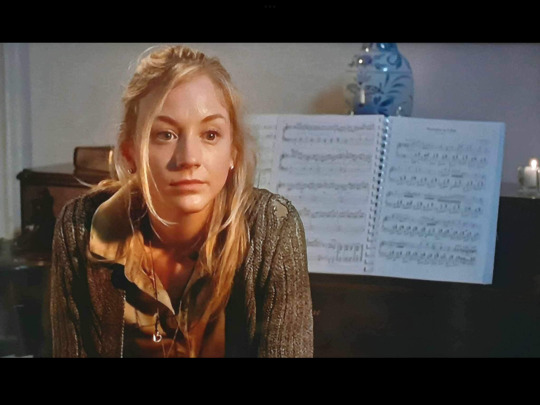
...I'm sure we all remember this lovely decorative piece on top of Beth's piano in 4x13 Alone.
BTW, @wdway, Queen of Chevrons and V symbolism would like you all to appreciate the lovely chevron pattern on Beth's knitted jacket...

...a pattern we've just established is a possible reference to the symbolism around the Holy Grail as it is utilized in TDVC...
And the reason we all instinctively knew this particular vase on top of Beth's piano was more than just random kitchy knick knack was because...

Yeah. In the words of the great Rick Grimes, "That vase...That's something special"...
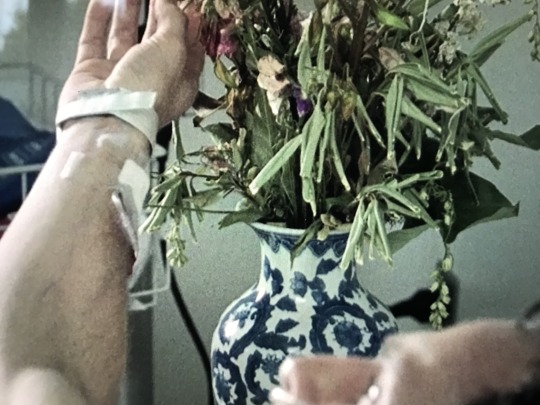
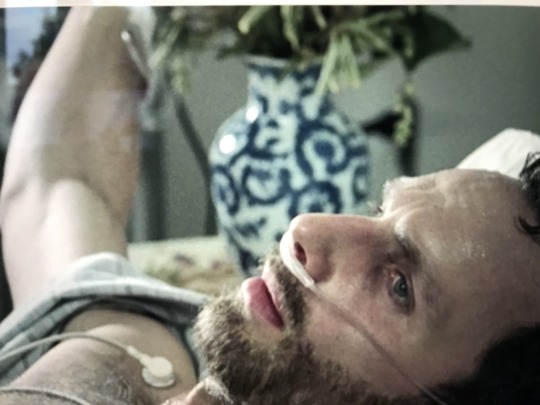
Yeah. Rick Grimes knows a thing or two about vases/vessels, as he's just woken up from a Tour de Liminal Space between the Realms of the Dead and the Living...
Most certainly a special vase/vessel indeed...
In fact, it was special enough to make an appearence in a hallucination in TWD 9x5 The Bridge, when Rick "died" (but not really).

And much like our thirsty Venus/Aphrodite from the French beach...

...our OG Sirius figure Rick Grimes, the first one to dissappear from the night sky only to return/ressurect/be reborn later and have a reunion with his loved ones, was also feeling the dehydration after his return/resurrection/rebirth...

...and we know Beth likes her drink...
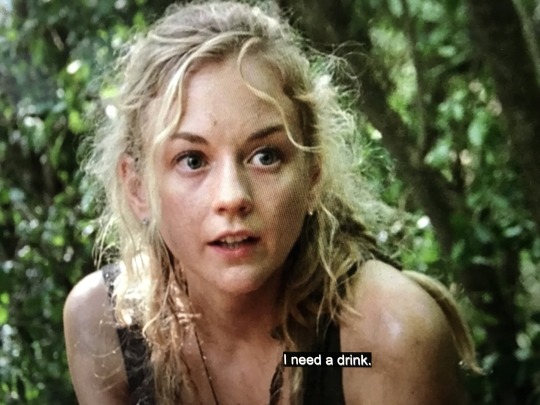
Remember how I’ve been talking about the importance of the Jeep Cherokee symbolism lately? I've even been theorizing, like the desperate fangirl I am, that one of the cars from the Louvre spoiler pics could be a Jeep Cherokee. (if you have no idea of what I'm talking about, do seek out yesterday's post plus the Trunk Resurrection posts)

A Cherokee rose in a beer bottle vase/vessel. Meant to instill hope and faith in Carol. Along with a story about the Grail of Tears, excuse-moi, TRAIL of tears…
(...also I have written probably 15 000 posts about beer symbolism in the past, check out those, and I also don't have time to elaborate on the name of the beer brand, Sweetwater, but I'm leaving it here for you @wdway)
I have a long list of Blue Clues, and I’ve compiled a bunch of them in the Blue Clue post, but among more recent examples that stand out is definitely the "Heart Of Blue" boat from 10x13 What We Become. Be sure to check out the numbers on the sail and tell me if you don't believe me when I say that the Blue Clues and the 101-1x1-one one- symbolism go together. Because it’s the number 11 (or 101-1x1-one one, as we discussed yesterday.
Also, @wdway who is a magician with numerology, would waste no time pointing out that the other number seen on the sail, the "22", represents the 22nd letter of the alphabet, namely the "V".
V for Venus perhaps? Or Team Violet?
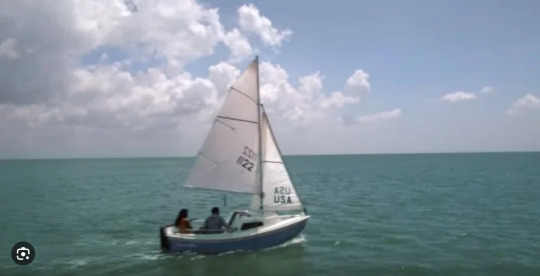
This is the episode when Michonne finds Rick’s boots (boot = trunk = vessel) on a boat, no less (another vessel).

The boat has the numbers 672 written on its side...

...something which makes it easily recognizible in case we should happen to come across it again at a later point.
...which we did. We came across it again.
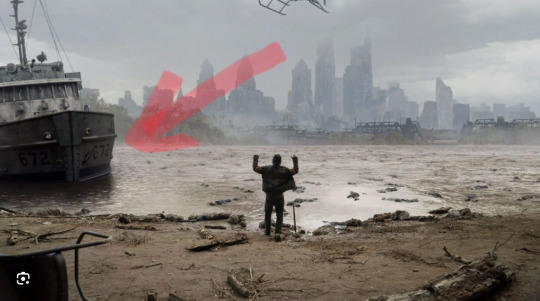
...like here, in the coda of 11x24 RIP, where we see a flashback of Rick throwing his backpack with his boots onboard the 672 vessel before he's apprehended by the Mean Helicopter Guy. This is why Michonne later was able to find his boots in the boat. Again, I highly reccomend this post by @angelthefirst1 for some absolutely glorious side-by-side comparisons of several Beth and Rick moments (and equally glorious additions by others).
So, from a symbolism point of view, what are we talking about here? It's about HOPE and FAITH. When Daryl told Carol the story of the Trail of Tears and the symbolism around the Cherokee Rose in season 2, it was to give her hope and faith. The Cherokee Rose in a beer bottle vase (vessel) is Daryl's vessel of hope and faith, extended to Carol at a time when she didn't have any.
When Michonne finds Rick's boots onboard the 672 vessel, she realises Rick could be alive (boot = trunk = vessel symbolism). She arrived at the island in a blue boat/vessel (called Heart Of Blue, no less), and she found Ricks boots (which in and of itself is a representation of Trunk symbolism, because boot = trunk, check out the Trunk Resurrection posts if you have no idea of what I'm on about) inside the boat/vessel, the same vessel we later see when we for the first time see Rick Grimes alive after he "died" (but not really) in 9x5 The Bridge.
Rick's boots gave Michonne the hope and faith she needed to go out in search of him. She found that hope onboard the 672 vessel.
Daryl's drinking vessel of choice when he stumbles out of the French waters in 1x1 L'ame Perdue is a blue bucket.
The vase we see on Rick's bed-side table in TWD 1x1 has blue decor on white background.
The vase we see on Beth's piano in 4x13 Alone has blue decor on white background.
The "Heart of Blue" boat that brings Michonne to the island where clues about Rick are to be found is blue (obviously, it's in the name), complete with a 101-1x1-one one-referance (and a 22-V referance) on its white sail.
It's like the vessel/vase symbolism represents the journey between the realms, a way for characters to move between the realms, a way in which loved ones, long thought to be dead, can travel between the realms, from the percieved Realm of the Dead, back into the Realm of the Living. They are vessels in which "dead" characters are given an opportunity to "wake up", they are vessels for "life", for "resurrection".
It's like they're Vessels of Hope and Faith...
...and venereal diseases?????
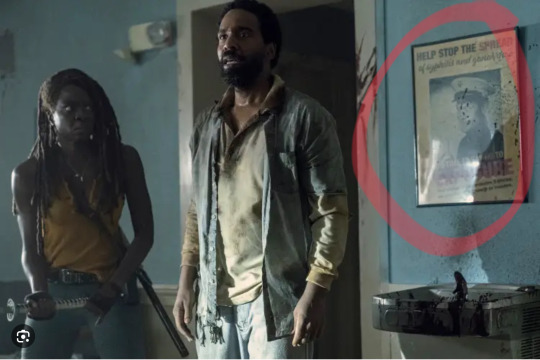
In case it doesn't come across, this helpful poster inside Michonne's Vessel of Hope and Faith implores the public to help stop the spread of syphilis and gonorrhea. I'm not at all opposed to effective public health measures, such as information campaigns, but this poster, in this particular episode, in a literal Vessel of Hope and Faith seemed super random. So I turned to my trusted old friend etymology for advice:

What do you know, the term "venereal” is directly linked to Venus, through my favorite academic dicipline etymology!
Michonne's vessel of hope and faith is ultimately a Venus reference. And because we love repetition:
Daryl stumbling out of the water is a dramatic reenactment of the Bottichelli painting The Birth Of Venus.
Venus and Sirius are two sides to the same story, as they're both concidered morning stars. Daryl's weapon of choise, outside the crossbow, is a Morningstar. Beth is a Sirius figure, a morning star.
Rick is the OG Sirius character, who disappeared from the night sky only to "resurrect" later. Beth is the next.
Beth, Rick and Daryl are all surrounded by the same blue bird symbolism.
And, there's currently filming going on at the Louvre, which, among other things, is home to the famous statue Venus de Milo.
And if this ol' fangirl is correct in her wild speculations, a car seen in a spoiler pic is a Jeep Cherokee, which certainly brings me lots of Hope and Faith that interesting Stuff and Thangs are coming up shortly in Daryl Dixon's European Adventure.
17 notes
·
View notes
Text
Now that I'm done with the main story I'd like to take some time to explain a small part about why Pokemon Scarlet (and Violet) mean so much to me—and why they were the first games in the series to make me cry in several years. (warning for discussions of parental death under the cut)
Generation 9 was the first time I was playing a brand new generation after my mom had passed from cancer a year and a half prior. I wasn't expecting to have this fact be relevant to my experience with the game, but one of the first things that struck me not long after booting it up was the design of the player character's mom. She looked so much like my own mother that I genuinely had to take a step back from shock for a bit. But it was surely just a coincidence, right?
That initial double take moment aside, I continued through the game fairly normally, enjoying it quite a bit despite its fairly obvious graphical limitations and occasional glitching. I loved exploring the wide open world of Paldea; I'm very meticulous about being thorough in games and seeing what every area has to offer, and while I wasn't quite able to get to everything considering the sheer size of the map, I still did my damndest to clear out as much of it as I could. I loved the colorful cast of characters and the stories that accompanied them; Nemona was a bundle of joy (and I quickly claimed her as my lovely autistic daughter because that's what she is), Penny and the Team Star storyline were well thought-out and compelling, and Arven's quest, despite me being spoiled on a few details, was heart-rending and I was invested the whole way through.
Speaking of spoilers: I knew going into the game that Arven's mom/dad was canonically dead depending on which version you were playing. But that didn't stop the emotional impact of the final confrontation with the professor from hitting me the way it did.
As I said, my mother passed away due to complications from breast cancer; she spent an agonizingly long week in the hospital dealing with sepsis (among other things) before her condition took a turn for the worse and she was taken off life support on June 9th, 2021. During that time, I never got the opportunity to talk to her or even visit her—I asked over and over, but she was only allowed a limited number of visitors which were being taken up by other family members. My last in-person conversation with her was while helping her to bed one night, in which she told me she would have my dad take her to urgent care the next morning. At the time, I didn't even consider the possibility that she might not end up coming home. When that fact finally hit me a few days later, I wrote a letter making some promises to her (that I wasn't able to keep because the grief ended up hitting me like a truck) and telling her I loved her, but it was too little too late: my mom was on life support and only semi-conscious; my letter was read to her by my sister when she went to visit and I will never know if she actually heard my words. The day I was finally able to see her was the day she passed, where I held her hand for one final time and was met with.....silence. Obviously. But just because something is to be expected doesn't mean it won't hurt.
Long story short, I was not only dealing with the grief of losing her, but also the pain of not having proper closure; of being able to talk with her knowing for sure it would be the last time. So imagine my reaction when I realized that Arven was going through the exact same thing with his own mother—having been left behind without so much as an explanation, and then said mother dies before she ever has the chance to set things right with him. And his situation is compounded even further by having to contend with seeing the AI professor looking and speaking exactly like her, finally getting the acknowledgement from his mother he's wanted for so long relayed by the AI but finding himself struggling to accept it given how much it's too little too late, and then she leaves him behind too (albeit for more understandable reasons), meaning he essentially loses his mom twice over—all this while pushing through the trauma of revisiting a place that wounded the only companion he had so badly that he thought he might end up losing him, too. My relationship with my mother was not nearly as tumultuous as Arven's—but I could still relate to those feelings of loss and powerlessness and thus found myself shedding tears after the AI professor's final farewell. Because I saw myself in that grieving kid who just wanted closure.
Scarlet and Violet are by no means perfect games. But I would be lying if I said they didn't have a profound impact on me and helped me feel a bit less alone in my grief. And for that they'll always hold a special place in my heart.
#mel's musings#i still can't believe pokemon gave me the double whammy of a protag mom that looks like mine#AND a character with a dead mom less than 2 years after my mom passed. this shit is targeted i tell you#actually. pla was the first game that came out afterwards that i actually played. but you don't HAVE a mom in that game#well. i mean you PROBABLY do but it's not relevant because Isekai Bullshit#so yeah. first new game that mel plays after june 2021 where moms are relevant?#let's tear her heart into pieces why don't we. she'll love it (<-they're right. i DO love it but i hate that they know how to get me)#mel plays scarvi
4 notes
·
View notes
Text
SIDE 2C: ROUND 1: Selina Kyle (Catwoman) (DC Comics)/Loki (Marvel Cinematic Universe) VS Apollo (Percy Jackson)/Clark Kent (Superman) (Superman)




Propaganda for Selina Kyle (Catwoman)/Loki:
Two not quite villains who will never be content as heroes despite how much their friends and family would like them to be. They can sass each other and steal things together. In fact, Loki, being old as most artifacts, can claim that anything they steal technically belongs to him through some convoluted story that may or may not be true. So they've got this game going on with Batman. If he catches them, the museum can keep the object. Otherwise, Loki gets to keep "his stuff" and no one bothers them to avoid an incident with Asgard. It drives Batman up the wall. Loki and Selina are two beautiful Neutrals with a dash of chaos. He adores her and she loves his mystery and pizzazz. They bring out the best in each other. The Joker is dead and Loki has taken over his turf as the Crown Prince of Crime Alley. He sits on his ice throne with his darling Selina, finding new and vicious nonfatal ways of dealing with those who try to usurp them. They might intervene if they hear someone is doing something evil enough, so if you want to get rid of your enemies, feel free to snitch. Selina and Loki both think the other is sexy. Selina loves that Loki isn't quite evil but she doesn't feel bad for stealing when she's with him. He makes it fun. Loki loves that Selina has given him a chance and doesn't have grand expectations of heroics from him. That he doesn't need power to keep her.
Propaganda for Apollo/Clark Kent (Superman):
almost accidentally submitted in the other tournament form😅 :
at first I was just like "Apollo gets a crush on Superman and tries unsuccessfully to flirt with him multiple times" but then I started shipping it accidentally so now it's "casually dating -> friends"
I was reading some DC fic and it mentioned the god Apollo (who also exists in DC but is not relevant he is different) not liking Superman and I immediately was like "what? no. apollo is a simp and would totally crush on superman" because I have pjo!Apollo brainrot and I started planning a fic and a whole DC/PJO fusion universe to go with it. Superman is powered by the sun, and he is hot, and his motto includes the word "truth", these are all the reasons Apollo tells himself he should date Superman, maybe superman mentioned once in an interview that he knows to play the harmonica or something too (Apollo is a god of many things including the sun, music, and truth)
anyway I wasn't planning on seriously shipping them, I don't think Clark would be into Apollo, not exactly his type. just wanted to write some crossover shenanigans and Apollo being a loser(affectionate <3) but while planning the fic, I didn't know how I want to end it , and started thinking "what if they did date, though?", and settled on the setup of Clark being hopelessly in love with Batman, who is really not in a mental place to date/ Clark is too afraid of rejection or something to ask him, and Lois encourages Clark to try going out with new people to get over Batman, so when Apollo starts flirting with Superman, it's at the right timing and Clark decides to give it a chance and they get to know each other
anyway they get together and I have some scenes written exploring what they could have in common, and other characters from both canons reacting to this relationship, but I don't want sum up alll of it here because it's a lot. eventually they break up but remain friends because I don't see them as an endgame ship (Apollo being immortal and stuff I don't think they would date for more than a year), I think Apollo would encourage Clark to act on his crush on Batman.
Art Credit: Catwoman/Loki art by @/kannra-orhara Superman/Apollo Art by @/verdantik* *(The Superman drawn by 0boywonder0 on Deviantart, and colored by @/thebrunox)
#Crossover Ships Tournament#Poll Tournament#MCU Loki#Loki#MCU#Selina Kyle#Catwoman#DC Comics#Percy Jackson and the Olympians#PJO Apollo#Superman#Clark Kent
24 notes
·
View notes
Note
Are there any characters in toh that you felt they should have never been created?
Or characters that you think would had better the plot, or move the plot forward if they had more focus?
Personally, I think Vee is just there and her existence didn't serve much, her screen time could've been used for smth else.
So the first part of this is… interesting to me. It's incredibly hard to ever say a character should never have been created unless A: them simply existence causes problems with the rest of the canon and the story itself or B: you know their inclusion was doomed from the start. This second one is really hard to be able to clarify though unless you have behind the scenes information and the like because unless they were made to be fridged or be offensive, etc. like that, there are few concepts that are bad from the get go.
With that said, The Collector easily should not have been in the show. There just wasn't time for him or the human realm and S3 has been very clearly struggling with those facts. Since he was also introduced in S2B, it's known that he was made after the shortening was very clear to the crew and they should have cut him and focused on Belos, especially since Belos is the big bad anyways.
The second question just gets responded to with: Raine. Raine and Darius. Honestly, just the coven head rebels in general should have probably gotten an entire episode actually dedicated to them that could have helped sell the threat, give them more personality as an organization rather than feeling like they exist to get around tropes or/and Raeda angst, etc. like that. Then again, quite frankly, with how little they've actually done with Raine outside of "ISN'T IT TRAGIC HOW EDA CAN'T BE WITH HER LONG LOST, TRUE LOVE!?", Raine as a character and their plotline probably could have been cut but it was something Dana wanted from the start of the show and S2A would have mostly not been affected by the shortening so they could have possibly had more of a role. Then again, they were also made to be Eda's long lost love so…
And finally Vee. Vee is… complicated. Honestly, it's hard to talk about Vee without talking about her episode, Yesterday's Lie. After all, maybe there were plans to do more properly with her (and she easily would have had the most interesting part of a season on Earth because of having to give up the identity that made her friends and have a place in the world back to Luz, if that was actually discussed of course) but as is… She's mostly just the one episode and looking cute. Worse yet, almost all the narrative goals are tied to Vee so their triumphs and successes are also tied to her.
Now let me get this out of the way: I like Vee. I think she's incredibly likable, cute, etc. like that. She (and the ClarVee ship) was probably the only reason I wrote anything immediately after Yesterday's Lie's ending left a bad taste in my mouth because it rubbed me the wrong way even on first watch. Her backstory is compelling, explains how she can be shy but also have a backbone when the chips are down and her limited interactions with her friends is incredibly charming, even before the MashVee ship existed.
And I'm not going to argue she shouldn't have existed. Character built for a single episode are fine. TOH actually has a paradox going on that while some characters desperately needed more exploration, like Amity, others very clearly should have been cut sooner rather than later. I mean, what could have been done had they just not spent two episodes of S2 on Gus when Gus isn't important to the narrative in any way and Hexide stopped being relevant to the show after S1? How much did we have to have Huntlow if it meant that Luz, who is one there for Hunter's biggest character moments, literally never speaks to him between Hunting Palisman and Hollow Mind?
But Vee was built for specific narrative purposes and does them well. Quite frankly… Too well. To the point where it creates problems. But that has to do with the narrative goals of Yesterday's Lie rather than Vee herself. The two just interlinked because when you make a character for a single episode, you know their narrative goals and how organically and well they function with those goals is part of evaluating the character.
And the narrative goals of Yesterday's Lie seems to be to have:
A: Given an answer to why no one was freaking out about a child going missing for MONTHS and it does this one quite well just by Vee being a shapeshifter.
B: Criticize Luz and whether or not she actually had any reason to leave which is the one Vee interacts with the most and is also the biggest problem to.
C: To build Camila's character, establish her unending well of understanding since she never judges Vee for even a second, nor Luz's story about the Isles, and then end on a mid-season cliffhanger I have SEVERE issues with but is outside the scope of this blog.
Vee's goals thus are to be able to fill Luz's shoes, which she does naturally, be able to scold Luz about her life and to be able to contrast hard enough against the norm as to make Camila's sympathy shine through. Her slug form and her ability to shapeshift honestly fit two of these three really well by themselves. It was a genuinely elegant and clever concept/implementation that was good for what they wanted.
But then there's Vee's actual character and actions that play into B. And B is… A lot.
Because this is the episode that caused me to turn on Luz in my heart.
It wasn't immediate but there's one line from Luz that really sums up the fact that you have to trust Luz in order to not entirely agree with Vee in this episode. That you have to go off of only Luz's words and not her actions for what her backstory was like. To be able to believe Gus and Willow were the first chances at having friends. That no one ever understood her. That school was always a nightmare for her.
And that line is "Oh no, highschoolers," because that is the second time Luz quite literally ever has that response to ANYONE. In the ENTIRE show. She didn't have any worries about meeting kids in Hexide. She never had worries about trying to hang out with Amity despite Amity clearly hating her. She didn't worry about Amity's siblings, the various villains she met, Eda, King, etc. In general, Luz shows NO signs of social anxiety or any sort of manifestation of trauma in regards to bullying, rejection, etc. like that.
Worse yet is who these people are. They are quickly characterized as atypical people with nerdy interests and chill personalities. They'd be in the anime club or the role playing club or the video game club at school. They are by all intents and purposes, people like Luz. Nerds. Outcasts. Etc. like that. People Luz could have easily befriended. I mean, Vee did and she knows nothing about human society.
Yes, the two also have drastically different personalities but also Masha likes giving tarot readings to her friends. I feel like Luz's passion would just mix and amplify Masha's own passion and the two would literally go hunt monsters together while Vee makes sure they don't do anything stupid. Luz could go on a rant about her philosophies on magic and the faux stoner dude would be enraptured by how wild and imaginative Luz could be.
And this all begs the question of WHY didn't Luz have friends?
Well… Her opening montage, the first real introduction to the character, kind of explains it but not kindle. After all, two of the three events we're shown, and VERY much so her presentations and projects, are about getting attention. About making sure she does something big enough that people consider her contribution the best, regardless of those around her. So she can't match a cheerleader physically? Call that nothing and show a weird trick you know. Wants to make sure people talk about her performance in the play? Opening night, do something that you didn't clear with your director and catches everyone off guard, even if it means going off script and possibly ruining the play.
Even worse is the clubs she IS joining there. After all, why isn't Luz a part of the anime club or something? Or a part of a book club back home? Well… Cheerleaders and actors are more popular. They get more attention. They're special. Nerds, outcasts, etc. I mean… Who wants to interact with those when it means people might look down on you?
And the final nail is that she does finally accept outcasts… So long as they have magic. And the closer she gets to Amity, the less she interacts with Willow or Gus, to the point where they spend close to zero time in Season 2. And why wouldn't Luz want to be with the popular witch instead of people who were only special by having magic in general?
Do I think this interpretation is intentional? No. Vee's friendships were merely to try and add a bit of gray into what was black and white. However, how Luz was introduced wasn't given enough thought to make such pointed questions work. Not when you're forcing the audience to ask these questions with Vee shouting "YOU HAD IT GOOD!"
So how good did Luz have it? Well, there were fellow outcasts in her own town, which appears to be pretty small, so she could have had friends and her mom is a literal saint. S3 would only reinforce this. And she still abandoned it all for three months so she could become a witch.
So… Sorry, but the statement of "If everyone you meet is an asshole, the asshole might be you," does fit sometimes. And it fits for Luz here.
And it's also the worst part of Vee because if Vee didn't exist… I might not have considered these problems. Not so quickly. But Vee being able to contrast Luz, to be successful in the human realm simply because she's willing to actually accept those around her and bend a little, not entirely, to what will make them like her, was one of her narrative goals. One of the reasons she is as she is.
And another time where TOH thinks it's being clever when it's really just shooting itself in the foot because it has never been smart enough to ask the questions it proposes. And it sucks that that's tied to a character who is so wonderfully likable otherwise.
44 notes
·
View notes
Note
Question I have BC I love your opinion and I think you have a great understanding of these characters (and jjk as a whole) what do you think about yuji and megumi's relationship and the parallels between them and suguru and gojo?? BC personally I think it's EVIL and hurts me so bad but also just.....idk I'm terrible with words so I can't exactly express why I think it's done so well but i do so just curious on what (if you even do) you think abt it?? I think parallels in jjk are honestly crafted so well in general and gege truly has such a clear idea and understanding of what and where he wants the story to go. Apologies if you've been asked smth like this before there's a very good chance I've missed it but I hope you have a good day and I hope megumi comes home soon bc it's getting pretty dark out 😞😞😞
HOLA anon. Thanks! I appreciate the vote of confidence 🫡
So I feel like your ask needs a thorough re-read of jjk, which I am unable to do at this time.
I also have to admit that I had never paid much attention to "parallels" in general, so that makes it a little harder to look back and pinpoint exact moments for a proper analysis of Megumi/Geto parallels. But I HAVE thought about this in passing before.
So, while I don't think I can do your ask justice, YES! I think aside from parallels, I'd also say that it feels like Geto's story is also meant to be a cautionary tale for Megumi.
Let's taco'bout it under the cut...
I'll start by saying that jjk has been exploring the idea of "intergenerational trauma that is passed down from generation to generation". So there's something that feels extremely cyclical about jjk right now--like a cog.
That said, the Megumi/Geto parallels are most likely meant to underscore how, due to the nature of the work they do, the same tragedy keeps happening time and time again.
If I were to pull a quote by Jung that encapsulates this, its the idea that "until you make the unconscious conscious, it will direct your life and you will call it fate."
Now, jjk has also felt like an exploration of the "corruption and redemption of the self" for some time now. To me, this means that a sorcerer is often confronted with the question of what is aspirational about his human nature and what isn't, but more importantly, the choices they make as a result of being confronted with this question.
In Geto's case, the aspirational values he chose were actually quite twisted. After all, he chose to justify committing genocide with his love for sorcerers. Similarly, Megumi had no qualms killing indiscriminately if it meant protecting Tsumiki.
They have both made a choice where protecting someone (aspirational value) justifies something not aspirational as a necessity (killing others is a turning away from aspirational values). In other words, you could say they have both "sinned" for lack of a better word.
This is where "saving" others who are ready and willing to be saved comes into play. Gojo couldn't save Geto because Geto wasn't asking to be saved; on the other hand, Yuji is trying to save Megumi because Megumi asked to be saved.
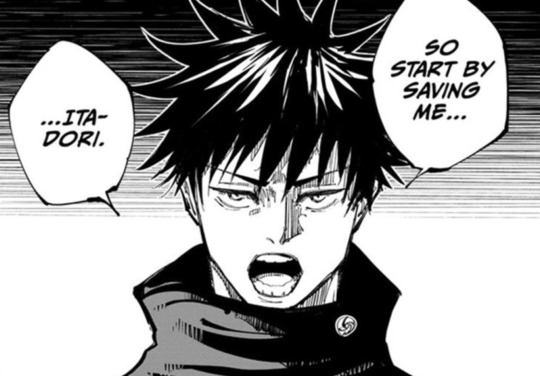
Megumi asking to be saved is relevant af because it means Megumi acknowledged something Geto couldn't or didn't acknowledge about himself.
The thing is that Yuji also had to be receptive to the idea of saving Megumi. As of ch143, Yuji had had his sense of self bruised and battered by Sukuna's rampage in Shibuya for which he felt responsible for. And now Megumi is asking him, a mass murderer, to save him.
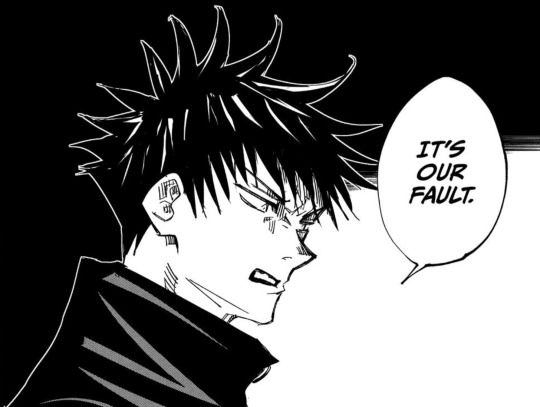
It's almost like Megumi is absolving Yuji of his sins by asking to be saved. This is Megumi validating Yuji's desire to save others. So, who's saving who, really?
On the other hand, while Geto was descending into a corrupted state, Gojo had his head so far up his ass with the whole "The Strongest" identity, that the best he could do was ask Geto if he had lost weight.
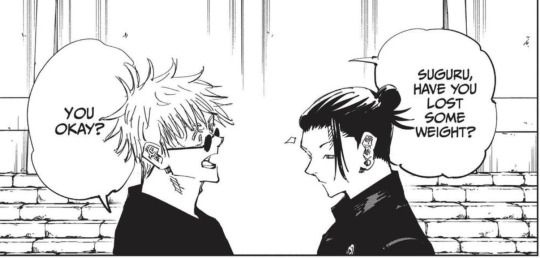
So I feel like this is where the parallels turn into a sort of continuation of what could have been possible if Geto would have come to Gojo and asked for help, and if Gojo was emotionally available to this bid for connection when it could have made a difference.
In retrospect, given the emotional state Megumi was in during the Yorozu reveal and how anxious he appeared to be during his fights inside the colony, I think that in asking to be saved, Megumi was asking for a lifeline from the bottom of his heart. He was asking Yuji for the strength and unwavering conviction that he was missing in himself.
I like to think Megumi knew he would have to kill others, and that he would be willing to do it if it came down to it. This meant Megumi might have been aware that he'd have to set aside his humanity and any aspirational values he might still be hanging onto.
So who better to ask than the one person he knows to have unwavering humanity?
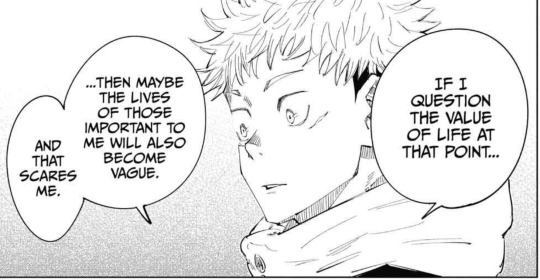
Geto never asked the same of Gojo.
So I am not sure whether Gege is trying to say that because Megumi asked to be saved it is more likely that he can be saved.
But here's the thing...
And I am very much aware that this is my personal preference, but I believe that Megumi (and Geto since we're on the topic of parallels) has to save himself.
While I LOVE the religious symbolism behind the idea of Yuji "saving" Megumi and think it's super bromantic, waiting to be saved absolves Megumi of responsibility for himself. And right now, at the core of Megumi's arc, is the idea that his sense of self was suppressed by Sukuna precisely because there was a hole in Megumi's sense of self that Sukuna could exploit, therefore arresting Megumi's development. To continue that development, Megumi has to choose himself.
So I am curious of where Gege takes it from here.
Now, on the topic of saving others, there's actually REALLY juicy symbolism around the idea of "saving" in chapter 236 and 238 where Sukuna is technically absolving characters in their last moments.
So that's a nice parallel and commentary on the idea of saving others.
Anyways, did this make any sense? lol. I read and re-read this thing several times and I kept making edits so I hope I was able to express my thoughts properly.

Hopefully the tangent made sense.
I think parallels in jjk are honestly crafted so well in general and gege truly has such a clear idea and understanding of what and where he wants the story to go.
Thank you for sharing your jjk-love. Yes, I couldn't agree more that, not only does Gege know where he's taking his story, his attention to detail on how he wants to execute these themes is fantastic.
Thank you for stopping by anon :)
16 notes
·
View notes
Note
I was looking back at your old asks and I definitely agree with your take on Denjiro, I'd say the same went with Kawamatsu? The way other samurai had some scenes before and after the onigashima raid but Kawamatsu and Denjiro just went mia, as in they didn't have much impact on the story telling after onigashima? Like I expected some scenes with Hiyori, they took care of her, expected Denjiro to be a bit better at fighting for some reason? After onigashima they felt like background characters
100%. There are many things that did not pay off in Wano, overall I think it is one of the worst arcs in OP (in my humble opinion), but the Scabbards were probably the biggest miss. They are hyped up like crazy in the early chapters of the arc, their intro's are epic and lengthy. Kyoshiro is initially presented as one of the "bosses" from the Shogun side, with a mysterious attitude and even a preliminary square-up with Zoro, only to fade away after the big reveal of his identity. All that teased power, his character crafting, for nothing. So yeah, I felt his strength was forgotten somewhere along the way.
As the most interesting Scabbard, he was the deep disappointment for me, but you're totally right about Kawamatsu, he's a close second. He too receives quite an impressive intro in Udon, a tearful backstory with Hiyori, and then he does absolutely nothing during the raid. I don't even remember the panels where he shows up after Onigashima, I vaguely recall a quick closure with Onimaru and the graveyard in Ringo, then bye.
Sure, the Scabbards as a whole confront Kaido and manage to deliver a few blows before being wiped away, but that wasn't nearly enough to live up to expectations. Not because the feat itself is not impressive, it is obviously, but a few choral scenes do not pay off for such detailed individual introductions. After Kaido, they just run around doing... nothing impactful, at least most of them. Of course you can argue that their actions do have relevance for the plot, of course they do, but they totally lacked emotional pay off.
There are a few exceptions, and Kiku might be one. She does get a couple of good scenes with Kanjuro (although their first duel is off-screened for some reason), and even a bitter, poetic ending, that invariably gets ruined by a fake-off death, in perfect Oda's fashion. As much as I like Kiku, it would have made MUCH more sense for her to die there. You could swap her death with Izo's (who basically died off screen?? seriously??). Inuarashi and Nekomamushi also get their nice final battles with important enemies, so I'd say they do close their arcs elegantly. Lastly, Kanjuro has possibly the best overall arc among the Scabbards.
Kin'emon, well, I never cared much for him, but he just ran around the entire time trying to do... something. Then there's the whole cut-in-half ordeal that I only want to forget, the worst part of all Onigashima. Ashura's death, although thematically meaningful, was too quick and easily dismissed to hold the weight it should have. Raizo had that endless duel with Fukurokuju that no one cared about, and they don't even explore the true reason of their rivalry (it's given in the SBS instead). I've already been through Izo, and Kawamatsu does... absolutely nothing after Kaido (and Orochi). Fights fodder. Cool.
But, after all, Oda's been struggling to give Usopp some decent scenes since Dressrosa, soooo...
Okay, end of rant. One Piece still number one. 🤘
6 notes
·
View notes